Impact of Organizational Behaviour on Tesco Company
VerifiedAdded on 2023/01/11
|18
|5468
|98
AI Summary
This report discusses the impact of organizational behaviour on Tesco Company, focusing on the influence of culture, politics, and power on team behavior and individual performance. It explores content and process theories of motivation and motivational techniques. The report also compares effective and ineffective teams and examines how organizational philosophies impact business situations.
Contribute Materials
Your contribution can guide someone’s learning journey. Share your
documents today.
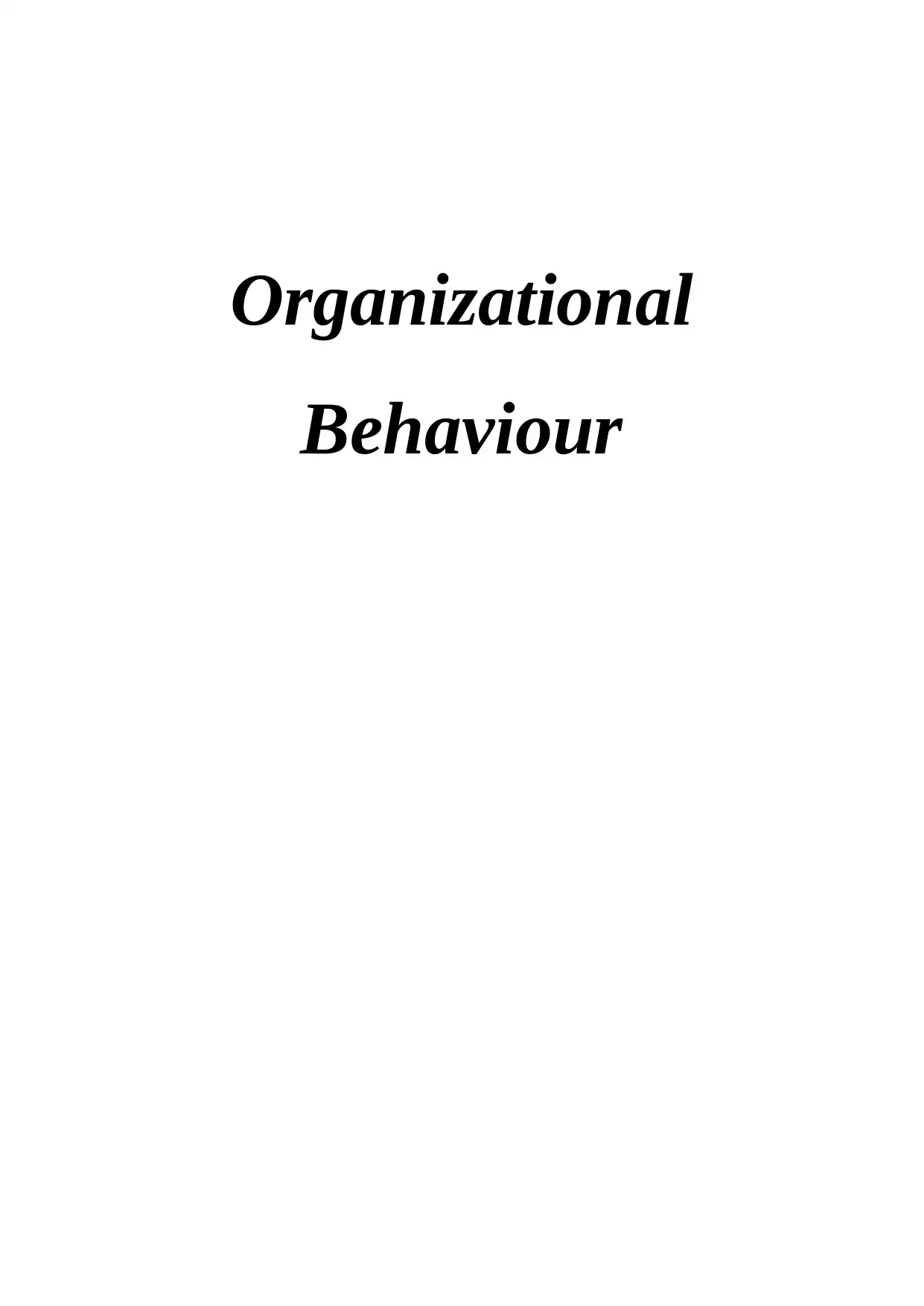
Organizational
Behaviour
Behaviour
Secure Best Marks with AI Grader
Need help grading? Try our AI Grader for instant feedback on your assignments.
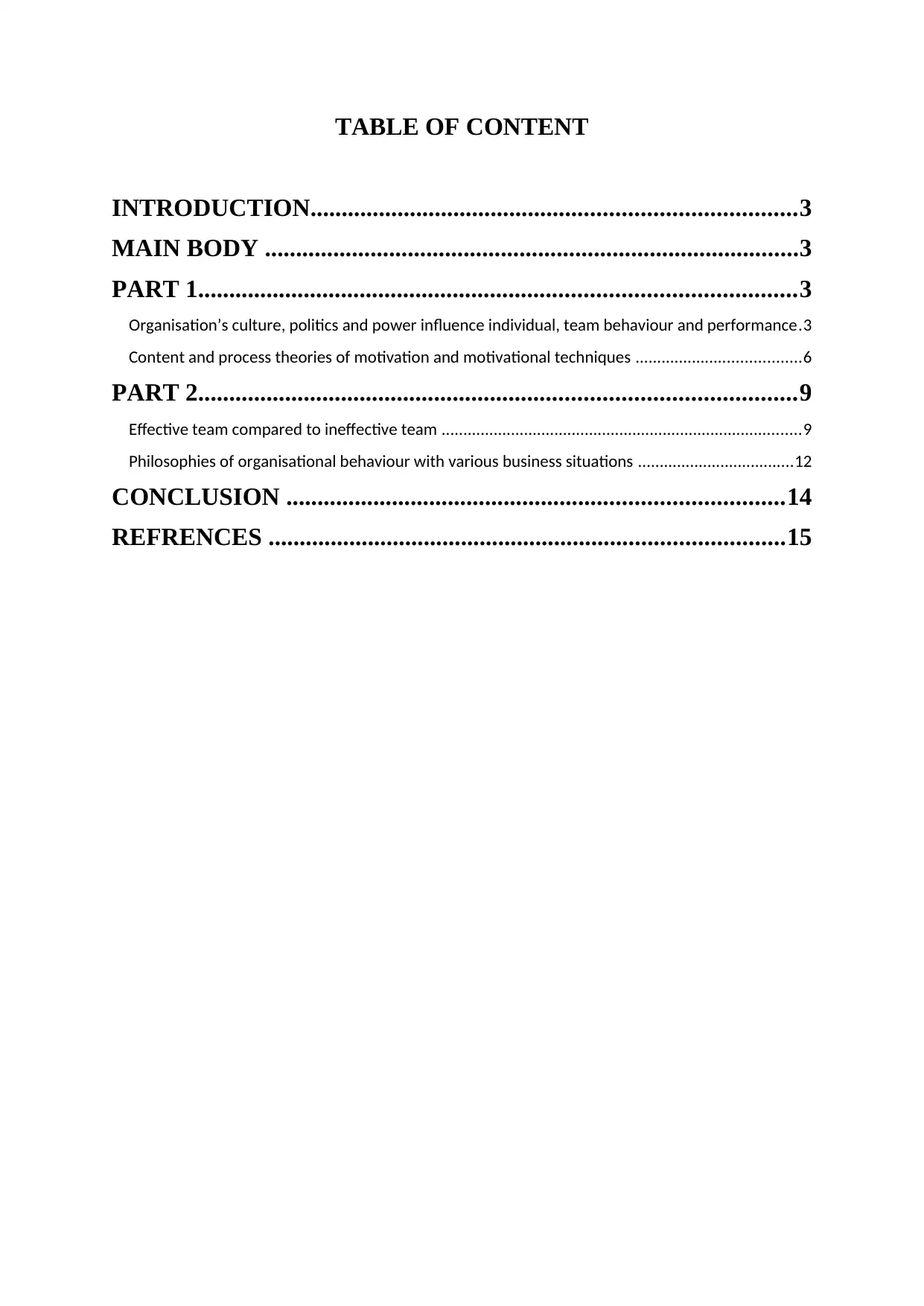
TABLE OF CONTENT
INTRODUCTION..............................................................................3
MAIN BODY ......................................................................................3
PART 1................................................................................................3
Organisation’s culture, politics and power influence individual, team behaviour and performance.3
Content and process theories of motivation and motivational techniques ......................................6
PART 2................................................................................................9
Effective team compared to ineffective team ...................................................................................9
Philosophies of organisational behaviour with various business situations ....................................12
CONCLUSION ................................................................................14
REFRENCES ...................................................................................15
INTRODUCTION..............................................................................3
MAIN BODY ......................................................................................3
PART 1................................................................................................3
Organisation’s culture, politics and power influence individual, team behaviour and performance.3
Content and process theories of motivation and motivational techniques ......................................6
PART 2................................................................................................9
Effective team compared to ineffective team ...................................................................................9
Philosophies of organisational behaviour with various business situations ....................................12
CONCLUSION ................................................................................14
REFRENCES ...................................................................................15
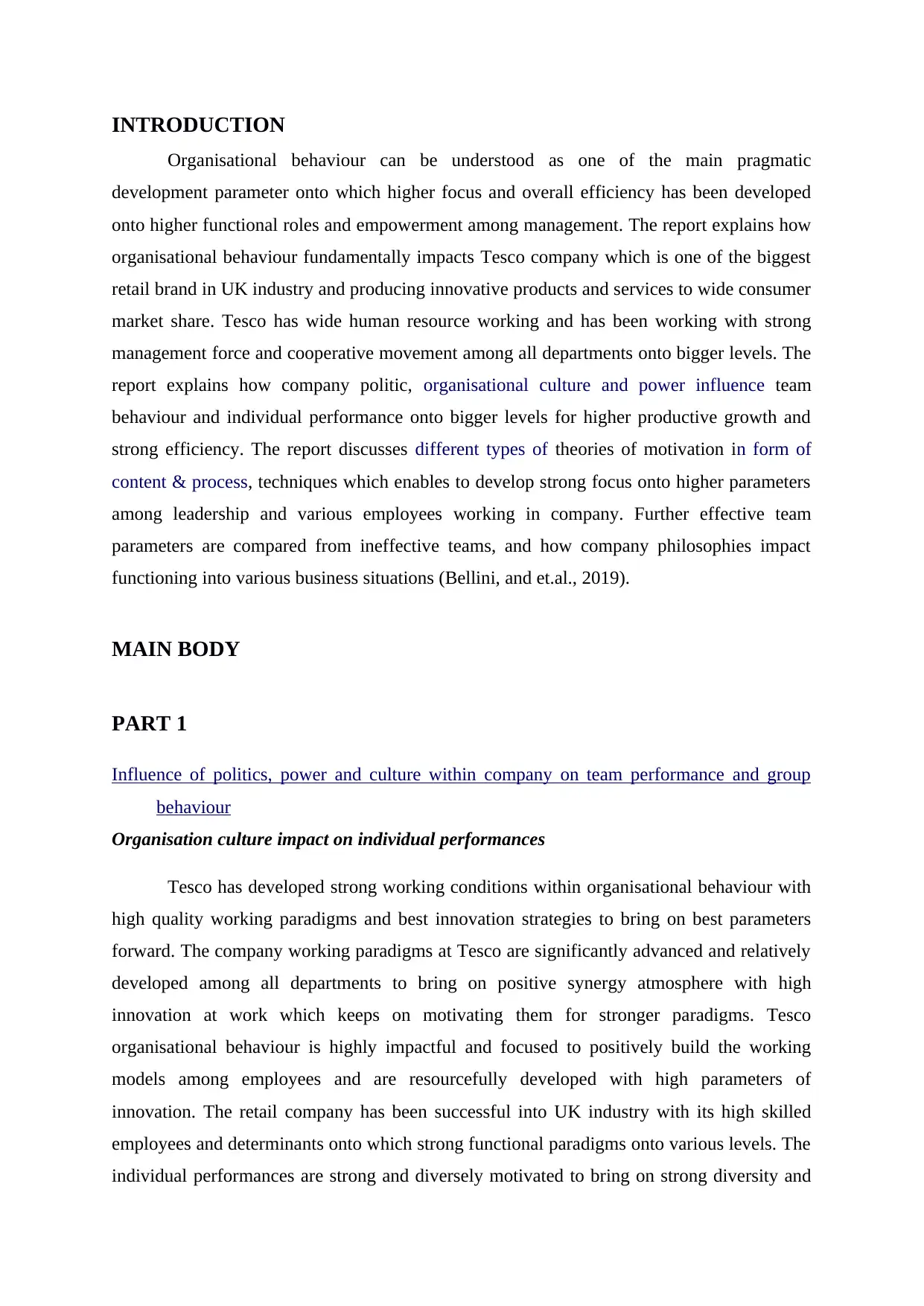
INTRODUCTION
Organisational behaviour can be understood as one of the main pragmatic
development parameter onto which higher focus and overall efficiency has been developed
onto higher functional roles and empowerment among management. The report explains how
organisational behaviour fundamentally impacts Tesco company which is one of the biggest
retail brand in UK industry and producing innovative products and services to wide consumer
market share. Tesco has wide human resource working and has been working with strong
management force and cooperative movement among all departments onto bigger levels. The
report explains how company politic, organisational culture and power influence team
behaviour and individual performance onto bigger levels for higher productive growth and
strong efficiency. The report discusses different types of theories of motivation in form of
content & process, techniques which enables to develop strong focus onto higher parameters
among leadership and various employees working in company. Further effective team
parameters are compared from ineffective teams, and how company philosophies impact
functioning into various business situations (Bellini, and et.al., 2019).
MAIN BODY
PART 1
Influence of politics, power and culture within company on team performance and group
behaviour
Organisation culture impact on individual performances
Tesco has developed strong working conditions within organisational behaviour with
high quality working paradigms and best innovation strategies to bring on best parameters
forward. The company working paradigms at Tesco are significantly advanced and relatively
developed among all departments to bring on positive synergy atmosphere with high
innovation at work which keeps on motivating them for stronger paradigms. Tesco
organisational behaviour is highly impactful and focused to positively build the working
models among employees and are resourcefully developed with high parameters of
innovation. The retail company has been successful into UK industry with its high skilled
employees and determinants onto which strong functional paradigms onto various levels. The
individual performances are strong and diversely motivated to bring on strong diversity and
Organisational behaviour can be understood as one of the main pragmatic
development parameter onto which higher focus and overall efficiency has been developed
onto higher functional roles and empowerment among management. The report explains how
organisational behaviour fundamentally impacts Tesco company which is one of the biggest
retail brand in UK industry and producing innovative products and services to wide consumer
market share. Tesco has wide human resource working and has been working with strong
management force and cooperative movement among all departments onto bigger levels. The
report explains how company politic, organisational culture and power influence team
behaviour and individual performance onto bigger levels for higher productive growth and
strong efficiency. The report discusses different types of theories of motivation in form of
content & process, techniques which enables to develop strong focus onto higher parameters
among leadership and various employees working in company. Further effective team
parameters are compared from ineffective teams, and how company philosophies impact
functioning into various business situations (Bellini, and et.al., 2019).
MAIN BODY
PART 1
Influence of politics, power and culture within company on team performance and group
behaviour
Organisation culture impact on individual performances
Tesco has developed strong working conditions within organisational behaviour with
high quality working paradigms and best innovation strategies to bring on best parameters
forward. The company working paradigms at Tesco are significantly advanced and relatively
developed among all departments to bring on positive synergy atmosphere with high
innovation at work which keeps on motivating them for stronger paradigms. Tesco
organisational behaviour is highly impactful and focused to positively build the working
models among employees and are resourcefully developed with high parameters of
innovation. The retail company has been successful into UK industry with its high skilled
employees and determinants onto which strong functional paradigms onto various levels. The
individual performances are strong and diversely motivated to bring on strong diversity and
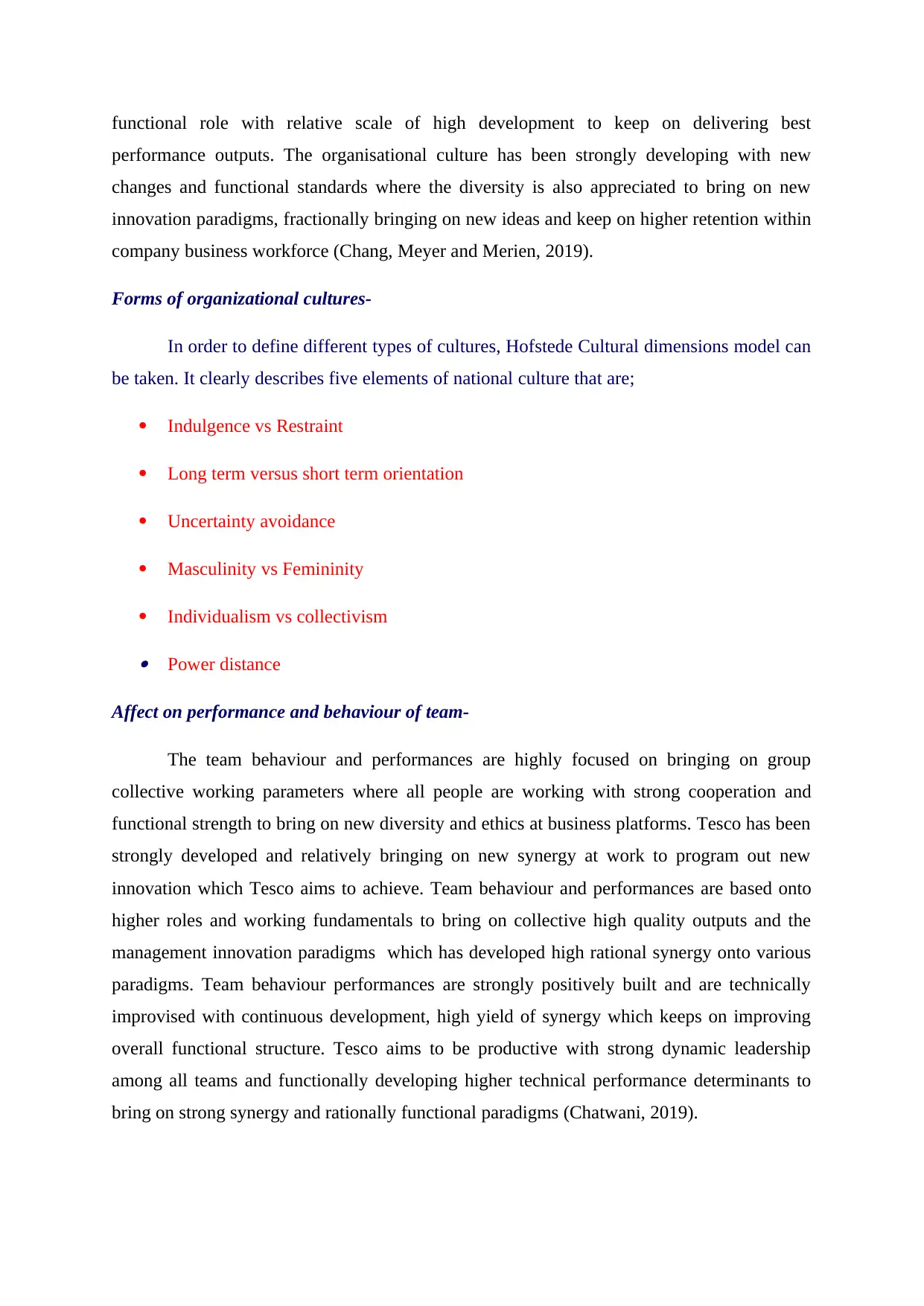
functional role with relative scale of high development to keep on delivering best
performance outputs. The organisational culture has been strongly developing with new
changes and functional standards where the diversity is also appreciated to bring on new
innovation paradigms, fractionally bringing on new ideas and keep on higher retention within
company business workforce (Chang, Meyer and Merien, 2019).
Forms of organizational cultures-
In order to define different types of cultures, Hofstede Cultural dimensions model can
be taken. It clearly describes five elements of national culture that are;
Indulgence vs Restraint
Long term versus short term orientation
Uncertainty avoidance
Masculinity vs Femininity
Individualism vs collectivism
Power distance
Affect on performance and behaviour of team-
The team behaviour and performances are highly focused on bringing on group
collective working parameters where all people are working with strong cooperation and
functional strength to bring on new diversity and ethics at business platforms. Tesco has been
strongly developed and relatively bringing on new synergy at work to program out new
innovation which Tesco aims to achieve. Team behaviour and performances are based onto
higher roles and working fundamentals to bring on collective high quality outputs and the
management innovation paradigms which has developed high rational synergy onto various
paradigms. Team behaviour performances are strongly positively built and are technically
improvised with continuous development, high yield of synergy which keeps on improving
overall functional structure. Tesco aims to be productive with strong dynamic leadership
among all teams and functionally developing higher technical performance determinants to
bring on strong synergy and rationally functional paradigms (Chatwani, 2019).
performance outputs. The organisational culture has been strongly developing with new
changes and functional standards where the diversity is also appreciated to bring on new
innovation paradigms, fractionally bringing on new ideas and keep on higher retention within
company business workforce (Chang, Meyer and Merien, 2019).
Forms of organizational cultures-
In order to define different types of cultures, Hofstede Cultural dimensions model can
be taken. It clearly describes five elements of national culture that are;
Indulgence vs Restraint
Long term versus short term orientation
Uncertainty avoidance
Masculinity vs Femininity
Individualism vs collectivism
Power distance
Affect on performance and behaviour of team-
The team behaviour and performances are highly focused on bringing on group
collective working parameters where all people are working with strong cooperation and
functional strength to bring on new diversity and ethics at business platforms. Tesco has been
strongly developed and relatively bringing on new synergy at work to program out new
innovation which Tesco aims to achieve. Team behaviour and performances are based onto
higher roles and working fundamentals to bring on collective high quality outputs and the
management innovation paradigms which has developed high rational synergy onto various
paradigms. Team behaviour performances are strongly positively built and are technically
improvised with continuous development, high yield of synergy which keeps on improving
overall functional structure. Tesco aims to be productive with strong dynamic leadership
among all teams and functionally developing higher technical performance determinants to
bring on strong synergy and rationally functional paradigms (Chatwani, 2019).
Secure Best Marks with AI Grader
Need help grading? Try our AI Grader for instant feedback on your assignments.
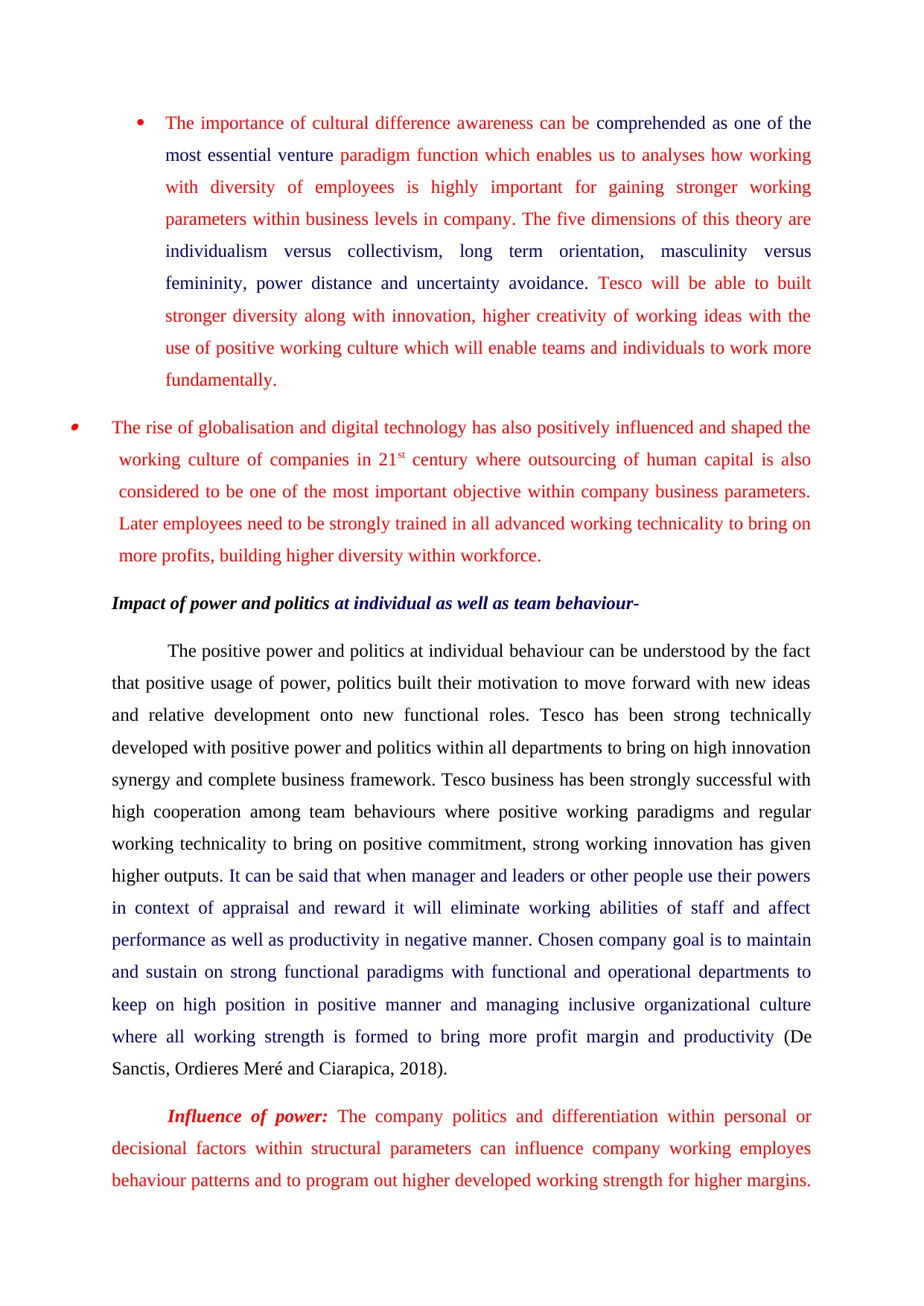
The importance of cultural difference awareness can be comprehended as one of the
most essential venture paradigm function which enables us to analyses how working
with diversity of employees is highly important for gaining stronger working
parameters within business levels in company. The five dimensions of this theory are
individualism versus collectivism, long term orientation, masculinity versus
femininity, power distance and uncertainty avoidance. Tesco will be able to built
stronger diversity along with innovation, higher creativity of working ideas with the
use of positive working culture which will enable teams and individuals to work more
fundamentally.
The rise of globalisation and digital technology has also positively influenced and shaped the
working culture of companies in 21st century where outsourcing of human capital is also
considered to be one of the most important objective within company business parameters.
Later employees need to be strongly trained in all advanced working technicality to bring on
more profits, building higher diversity within workforce.
Impact of power and politics at individual as well as team behaviour-
The positive power and politics at individual behaviour can be understood by the fact
that positive usage of power, politics built their motivation to move forward with new ideas
and relative development onto new functional roles. Tesco has been strong technically
developed with positive power and politics within all departments to bring on high innovation
synergy and complete business framework. Tesco business has been strongly successful with
high cooperation among team behaviours where positive working paradigms and regular
working technicality to bring on positive commitment, strong working innovation has given
higher outputs. It can be said that when manager and leaders or other people use their powers
in context of appraisal and reward it will eliminate working abilities of staff and affect
performance as well as productivity in negative manner. Chosen company goal is to maintain
and sustain on strong functional paradigms with functional and operational departments to
keep on high position in positive manner and managing inclusive organizational culture
where all working strength is formed to bring more profit margin and productivity (De
Sanctis, Ordieres Meré and Ciarapica, 2018).
Influence of power: The company politics and differentiation within personal or
decisional factors within structural parameters can influence company working employes
behaviour patterns and to program out higher developed working strength for higher margins.
most essential venture paradigm function which enables us to analyses how working
with diversity of employees is highly important for gaining stronger working
parameters within business levels in company. The five dimensions of this theory are
individualism versus collectivism, long term orientation, masculinity versus
femininity, power distance and uncertainty avoidance. Tesco will be able to built
stronger diversity along with innovation, higher creativity of working ideas with the
use of positive working culture which will enable teams and individuals to work more
fundamentally.
The rise of globalisation and digital technology has also positively influenced and shaped the
working culture of companies in 21st century where outsourcing of human capital is also
considered to be one of the most important objective within company business parameters.
Later employees need to be strongly trained in all advanced working technicality to bring on
more profits, building higher diversity within workforce.
Impact of power and politics at individual as well as team behaviour-
The positive power and politics at individual behaviour can be understood by the fact
that positive usage of power, politics built their motivation to move forward with new ideas
and relative development onto new functional roles. Tesco has been strong technically
developed with positive power and politics within all departments to bring on high innovation
synergy and complete business framework. Tesco business has been strongly successful with
high cooperation among team behaviours where positive working paradigms and regular
working technicality to bring on positive commitment, strong working innovation has given
higher outputs. It can be said that when manager and leaders or other people use their powers
in context of appraisal and reward it will eliminate working abilities of staff and affect
performance as well as productivity in negative manner. Chosen company goal is to maintain
and sustain on strong functional paradigms with functional and operational departments to
keep on high position in positive manner and managing inclusive organizational culture
where all working strength is formed to bring more profit margin and productivity (De
Sanctis, Ordieres Meré and Ciarapica, 2018).
Influence of power: The company politics and differentiation within personal or
decisional factors within structural parameters can influence company working employes
behaviour patterns and to program out higher developed working strength for higher margins.
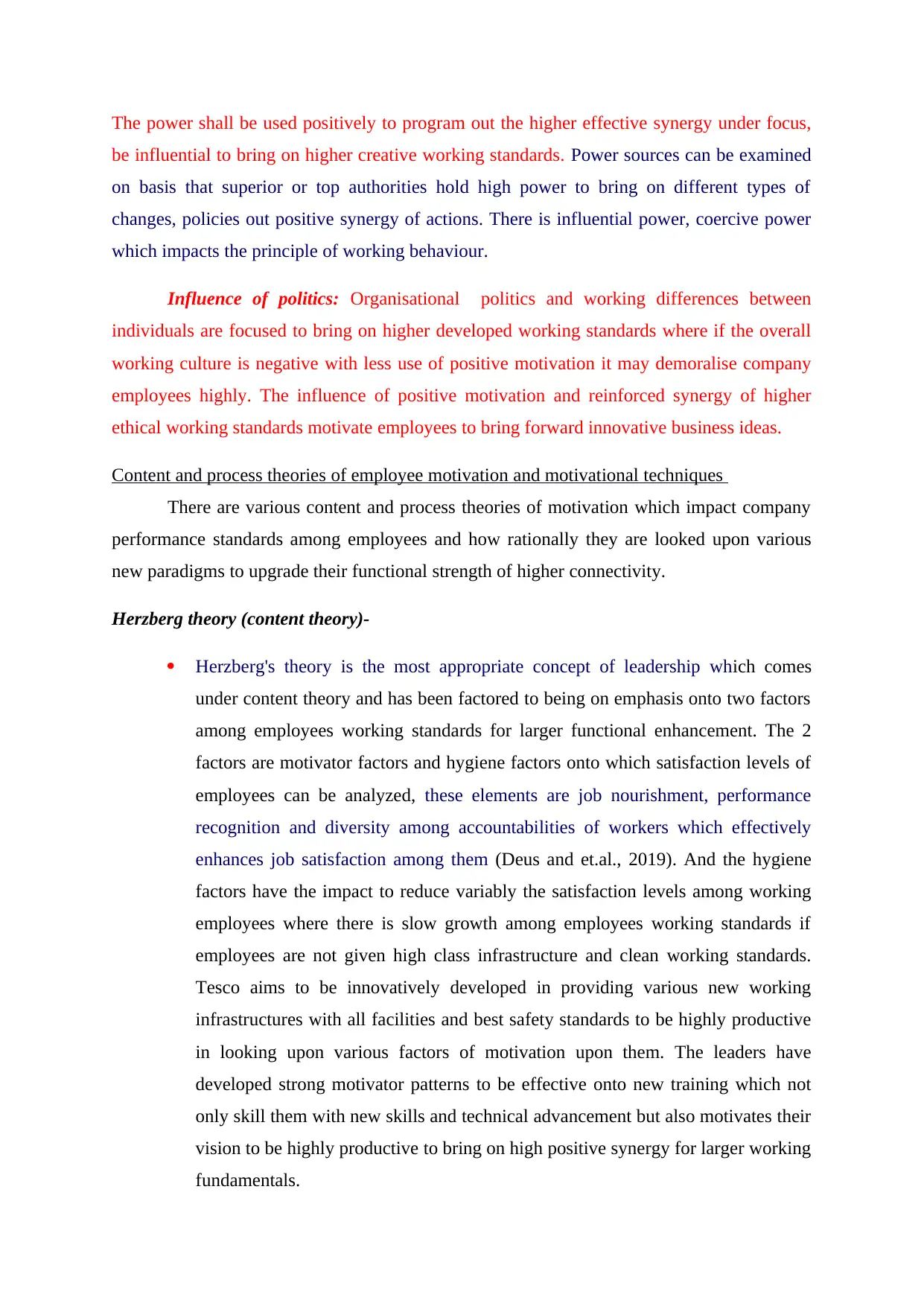
The power shall be used positively to program out the higher effective synergy under focus,
be influential to bring on higher creative working standards. Power sources can be examined
on basis that superior or top authorities hold high power to bring on different types of
changes, policies out positive synergy of actions. There is influential power, coercive power
which impacts the principle of working behaviour.
Influence of politics: Organisational politics and working differences between
individuals are focused to bring on higher developed working standards where if the overall
working culture is negative with less use of positive motivation it may demoralise company
employees highly. The influence of positive motivation and reinforced synergy of higher
ethical working standards motivate employees to bring forward innovative business ideas.
Content and process theories of employee motivation and motivational techniques
There are various content and process theories of motivation which impact company
performance standards among employees and how rationally they are looked upon various
new paradigms to upgrade their functional strength of higher connectivity.
Herzberg theory (content theory)-
Herzberg's theory is the most appropriate concept of leadership which comes
under content theory and has been factored to being on emphasis onto two factors
among employees working standards for larger functional enhancement. The 2
factors are motivator factors and hygiene factors onto which satisfaction levels of
employees can be analyzed, these elements are job nourishment, performance
recognition and diversity among accountabilities of workers which effectively
enhances job satisfaction among them (Deus and et.al., 2019). And the hygiene
factors have the impact to reduce variably the satisfaction levels among working
employees where there is slow growth among employees working standards if
employees are not given high class infrastructure and clean working standards.
Tesco aims to be innovatively developed in providing various new working
infrastructures with all facilities and best safety standards to be highly productive
in looking upon various factors of motivation upon them. The leaders have
developed strong motivator patterns to be effective onto new training which not
only skill them with new skills and technical advancement but also motivates their
vision to be highly productive to bring on high positive synergy for larger working
fundamentals.
be influential to bring on higher creative working standards. Power sources can be examined
on basis that superior or top authorities hold high power to bring on different types of
changes, policies out positive synergy of actions. There is influential power, coercive power
which impacts the principle of working behaviour.
Influence of politics: Organisational politics and working differences between
individuals are focused to bring on higher developed working standards where if the overall
working culture is negative with less use of positive motivation it may demoralise company
employees highly. The influence of positive motivation and reinforced synergy of higher
ethical working standards motivate employees to bring forward innovative business ideas.
Content and process theories of employee motivation and motivational techniques
There are various content and process theories of motivation which impact company
performance standards among employees and how rationally they are looked upon various
new paradigms to upgrade their functional strength of higher connectivity.
Herzberg theory (content theory)-
Herzberg's theory is the most appropriate concept of leadership which comes
under content theory and has been factored to being on emphasis onto two factors
among employees working standards for larger functional enhancement. The 2
factors are motivator factors and hygiene factors onto which satisfaction levels of
employees can be analyzed, these elements are job nourishment, performance
recognition and diversity among accountabilities of workers which effectively
enhances job satisfaction among them (Deus and et.al., 2019). And the hygiene
factors have the impact to reduce variably the satisfaction levels among working
employees where there is slow growth among employees working standards if
employees are not given high class infrastructure and clean working standards.
Tesco aims to be innovatively developed in providing various new working
infrastructures with all facilities and best safety standards to be highly productive
in looking upon various factors of motivation upon them. The leaders have
developed strong motivator patterns to be effective onto new training which not
only skill them with new skills and technical advancement but also motivates their
vision to be highly productive to bring on high positive synergy for larger working
fundamentals.
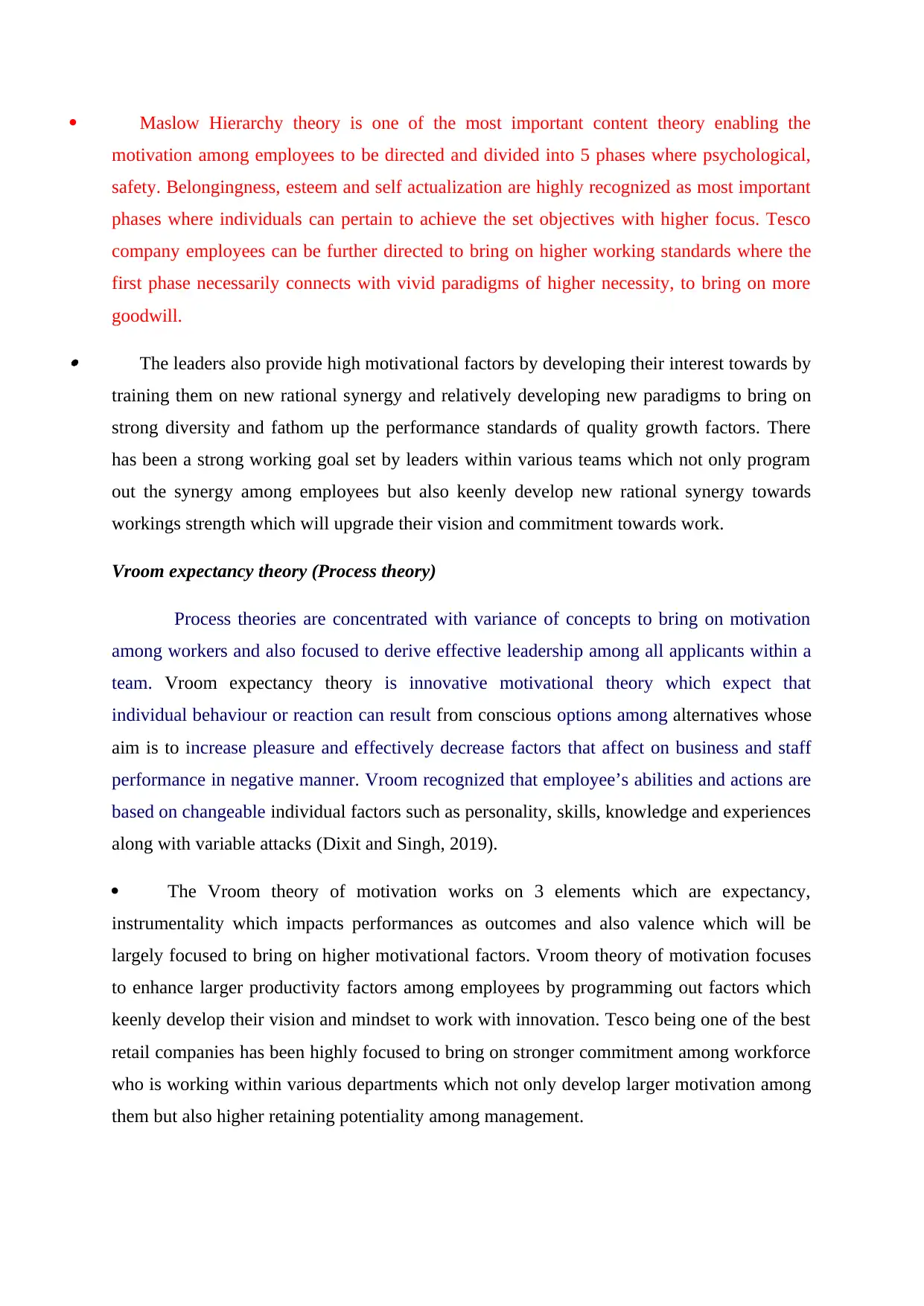
Maslow Hierarchy theory is one of the most important content theory enabling the
motivation among employees to be directed and divided into 5 phases where psychological,
safety. Belongingness, esteem and self actualization are highly recognized as most important
phases where individuals can pertain to achieve the set objectives with higher focus. Tesco
company employees can be further directed to bring on higher working standards where the
first phase necessarily connects with vivid paradigms of higher necessity, to bring on more
goodwill.
The leaders also provide high motivational factors by developing their interest towards by
training them on new rational synergy and relatively developing new paradigms to bring on
strong diversity and fathom up the performance standards of quality growth factors. There
has been a strong working goal set by leaders within various teams which not only program
out the synergy among employees but also keenly develop new rational synergy towards
workings strength which will upgrade their vision and commitment towards work.
Vroom expectancy theory (Process theory)
Process theories are concentrated with variance of concepts to bring on motivation
among workers and also focused to derive effective leadership among all applicants within a
team. Vroom expectancy theory is innovative motivational theory which expect that
individual behaviour or reaction can result from conscious options among alternatives whose
aim is to increase pleasure and effectively decrease factors that affect on business and staff
performance in negative manner. Vroom recognized that employee’s abilities and actions are
based on changeable individual factors such as personality, skills, knowledge and experiences
along with variable attacks (Dixit and Singh, 2019).
The Vroom theory of motivation works on 3 elements which are expectancy,
instrumentality which impacts performances as outcomes and also valence which will be
largely focused to bring on higher motivational factors. Vroom theory of motivation focuses
to enhance larger productivity factors among employees by programming out factors which
keenly develop their vision and mindset to work with innovation. Tesco being one of the best
retail companies has been highly focused to bring on stronger commitment among workforce
who is working within various departments which not only develop larger motivation among
them but also higher retaining potentiality among management.
motivation among employees to be directed and divided into 5 phases where psychological,
safety. Belongingness, esteem and self actualization are highly recognized as most important
phases where individuals can pertain to achieve the set objectives with higher focus. Tesco
company employees can be further directed to bring on higher working standards where the
first phase necessarily connects with vivid paradigms of higher necessity, to bring on more
goodwill.
The leaders also provide high motivational factors by developing their interest towards by
training them on new rational synergy and relatively developing new paradigms to bring on
strong diversity and fathom up the performance standards of quality growth factors. There
has been a strong working goal set by leaders within various teams which not only program
out the synergy among employees but also keenly develop new rational synergy towards
workings strength which will upgrade their vision and commitment towards work.
Vroom expectancy theory (Process theory)
Process theories are concentrated with variance of concepts to bring on motivation
among workers and also focused to derive effective leadership among all applicants within a
team. Vroom expectancy theory is innovative motivational theory which expect that
individual behaviour or reaction can result from conscious options among alternatives whose
aim is to increase pleasure and effectively decrease factors that affect on business and staff
performance in negative manner. Vroom recognized that employee’s abilities and actions are
based on changeable individual factors such as personality, skills, knowledge and experiences
along with variable attacks (Dixit and Singh, 2019).
The Vroom theory of motivation works on 3 elements which are expectancy,
instrumentality which impacts performances as outcomes and also valence which will be
largely focused to bring on higher motivational factors. Vroom theory of motivation focuses
to enhance larger productivity factors among employees by programming out factors which
keenly develop their vision and mindset to work with innovation. Tesco being one of the best
retail companies has been highly focused to bring on stronger commitment among workforce
who is working within various departments which not only develop larger motivation among
them but also higher retaining potentiality among management.
Paraphrase This Document
Need a fresh take? Get an instant paraphrase of this document with our AI Paraphraser
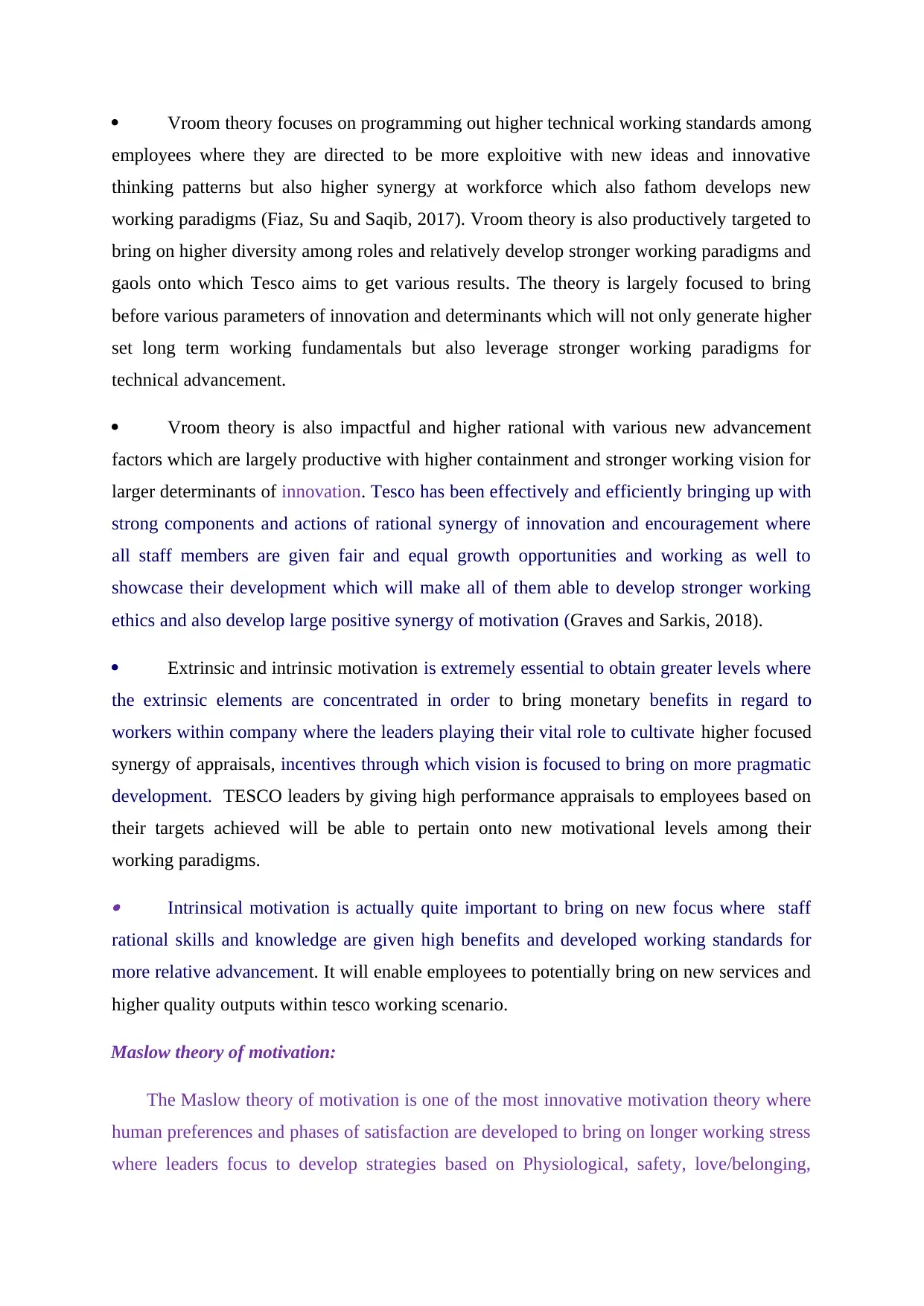
Vroom theory focuses on programming out higher technical working standards among
employees where they are directed to be more exploitive with new ideas and innovative
thinking patterns but also higher synergy at workforce which also fathom develops new
working paradigms (Fiaz, Su and Saqib, 2017). Vroom theory is also productively targeted to
bring on higher diversity among roles and relatively develop stronger working paradigms and
gaols onto which Tesco aims to get various results. The theory is largely focused to bring
before various parameters of innovation and determinants which will not only generate higher
set long term working fundamentals but also leverage stronger working paradigms for
technical advancement.
Vroom theory is also impactful and higher rational with various new advancement
factors which are largely productive with higher containment and stronger working vision for
larger determinants of innovation. Tesco has been effectively and efficiently bringing up with
strong components and actions of rational synergy of innovation and encouragement where
all staff members are given fair and equal growth opportunities and working as well to
showcase their development which will make all of them able to develop stronger working
ethics and also develop large positive synergy of motivation (Graves and Sarkis, 2018).
Extrinsic and intrinsic motivation is extremely essential to obtain greater levels where
the extrinsic elements are concentrated in order to bring monetary benefits in regard to
workers within company where the leaders playing their vital role to cultivate higher focused
synergy of appraisals, incentives through which vision is focused to bring on more pragmatic
development. TESCO leaders by giving high performance appraisals to employees based on
their targets achieved will be able to pertain onto new motivational levels among their
working paradigms.
Intrinsical motivation is actually quite important to bring on new focus where staff
rational skills and knowledge are given high benefits and developed working standards for
more relative advancement. It will enable employees to potentially bring on new services and
higher quality outputs within tesco working scenario.
Maslow theory of motivation:
The Maslow theory of motivation is one of the most innovative motivation theory where
human preferences and phases of satisfaction are developed to bring on longer working stress
where leaders focus to develop strategies based on Physiological, safety, love/belonging,
employees where they are directed to be more exploitive with new ideas and innovative
thinking patterns but also higher synergy at workforce which also fathom develops new
working paradigms (Fiaz, Su and Saqib, 2017). Vroom theory is also productively targeted to
bring on higher diversity among roles and relatively develop stronger working paradigms and
gaols onto which Tesco aims to get various results. The theory is largely focused to bring
before various parameters of innovation and determinants which will not only generate higher
set long term working fundamentals but also leverage stronger working paradigms for
technical advancement.
Vroom theory is also impactful and higher rational with various new advancement
factors which are largely productive with higher containment and stronger working vision for
larger determinants of innovation. Tesco has been effectively and efficiently bringing up with
strong components and actions of rational synergy of innovation and encouragement where
all staff members are given fair and equal growth opportunities and working as well to
showcase their development which will make all of them able to develop stronger working
ethics and also develop large positive synergy of motivation (Graves and Sarkis, 2018).
Extrinsic and intrinsic motivation is extremely essential to obtain greater levels where
the extrinsic elements are concentrated in order to bring monetary benefits in regard to
workers within company where the leaders playing their vital role to cultivate higher focused
synergy of appraisals, incentives through which vision is focused to bring on more pragmatic
development. TESCO leaders by giving high performance appraisals to employees based on
their targets achieved will be able to pertain onto new motivational levels among their
working paradigms.
Intrinsical motivation is actually quite important to bring on new focus where staff
rational skills and knowledge are given high benefits and developed working standards for
more relative advancement. It will enable employees to potentially bring on new services and
higher quality outputs within tesco working scenario.
Maslow theory of motivation:
The Maslow theory of motivation is one of the most innovative motivation theory where
human preferences and phases of satisfaction are developed to bring on longer working stress
where leaders focus to develop strategies based on Physiological, safety, love/belonging,
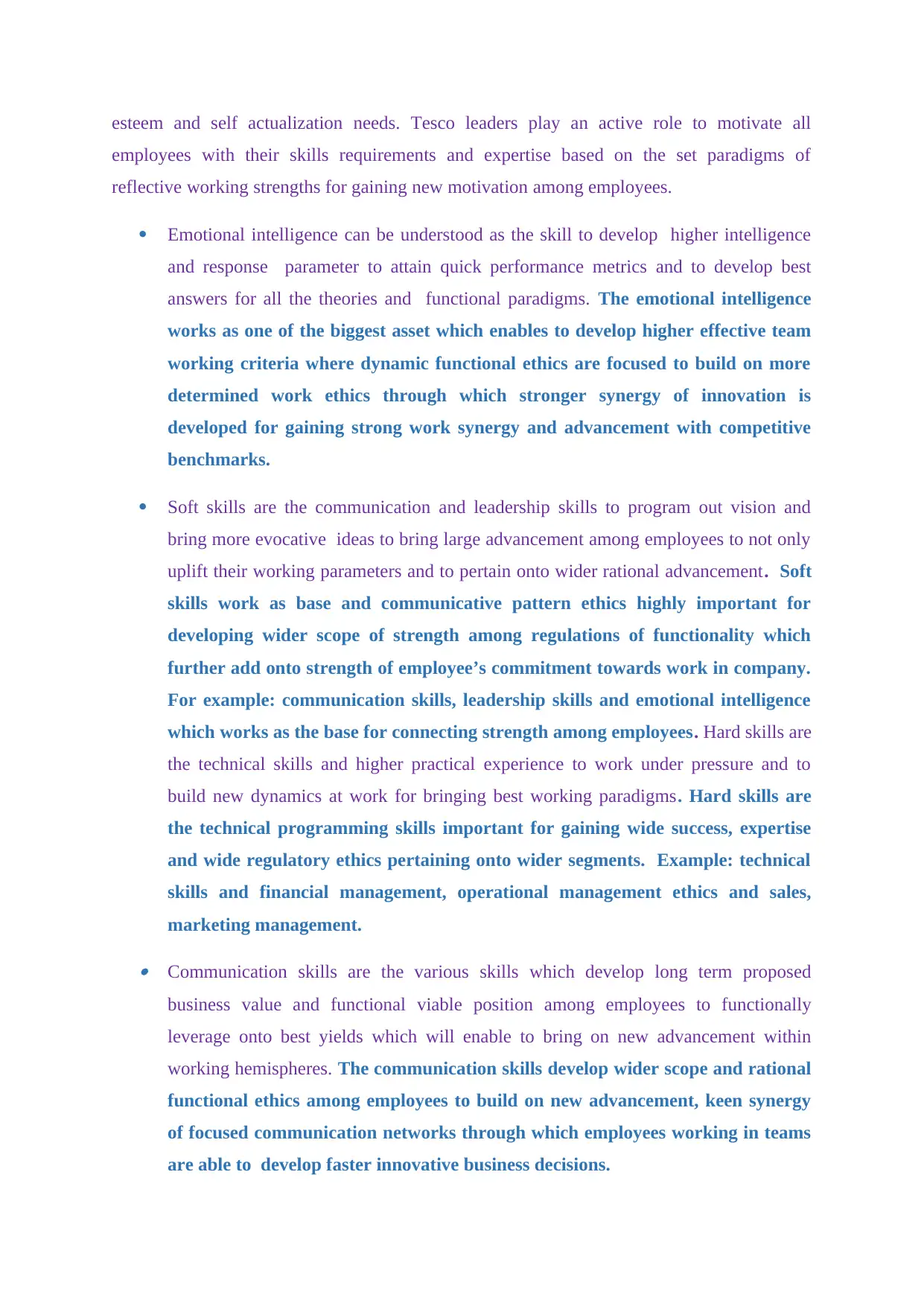
esteem and self actualization needs. Tesco leaders play an active role to motivate all
employees with their skills requirements and expertise based on the set paradigms of
reflective working strengths for gaining new motivation among employees.
Emotional intelligence can be understood as the skill to develop higher intelligence
and response parameter to attain quick performance metrics and to develop best
answers for all the theories and functional paradigms. The emotional intelligence
works as one of the biggest asset which enables to develop higher effective team
working criteria where dynamic functional ethics are focused to build on more
determined work ethics through which stronger synergy of innovation is
developed for gaining strong work synergy and advancement with competitive
benchmarks.
Soft skills are the communication and leadership skills to program out vision and
bring more evocative ideas to bring large advancement among employees to not only
uplift their working parameters and to pertain onto wider rational advancement. Soft
skills work as base and communicative pattern ethics highly important for
developing wider scope of strength among regulations of functionality which
further add onto strength of employee’s commitment towards work in company.
For example: communication skills, leadership skills and emotional intelligence
which works as the base for connecting strength among employees. Hard skills are
the technical skills and higher practical experience to work under pressure and to
build new dynamics at work for bringing best working paradigms. Hard skills are
the technical programming skills important for gaining wide success, expertise
and wide regulatory ethics pertaining onto wider segments. Example: technical
skills and financial management, operational management ethics and sales,
marketing management.
Communication skills are the various skills which develop long term proposed
business value and functional viable position among employees to functionally
leverage onto best yields which will enable to bring on new advancement within
working hemispheres. The communication skills develop wider scope and rational
functional ethics among employees to build on new advancement, keen synergy
of focused communication networks through which employees working in teams
are able to develop faster innovative business decisions.
employees with their skills requirements and expertise based on the set paradigms of
reflective working strengths for gaining new motivation among employees.
Emotional intelligence can be understood as the skill to develop higher intelligence
and response parameter to attain quick performance metrics and to develop best
answers for all the theories and functional paradigms. The emotional intelligence
works as one of the biggest asset which enables to develop higher effective team
working criteria where dynamic functional ethics are focused to build on more
determined work ethics through which stronger synergy of innovation is
developed for gaining strong work synergy and advancement with competitive
benchmarks.
Soft skills are the communication and leadership skills to program out vision and
bring more evocative ideas to bring large advancement among employees to not only
uplift their working parameters and to pertain onto wider rational advancement. Soft
skills work as base and communicative pattern ethics highly important for
developing wider scope of strength among regulations of functionality which
further add onto strength of employee’s commitment towards work in company.
For example: communication skills, leadership skills and emotional intelligence
which works as the base for connecting strength among employees. Hard skills are
the technical skills and higher practical experience to work under pressure and to
build new dynamics at work for bringing best working paradigms. Hard skills are
the technical programming skills important for gaining wide success, expertise
and wide regulatory ethics pertaining onto wider segments. Example: technical
skills and financial management, operational management ethics and sales,
marketing management.
Communication skills are the various skills which develop long term proposed
business value and functional viable position among employees to functionally
leverage onto best yields which will enable to bring on new advancement within
working hemispheres. The communication skills develop wider scope and rational
functional ethics among employees to build on new advancement, keen synergy
of focused communication networks through which employees working in teams
are able to develop faster innovative business decisions.
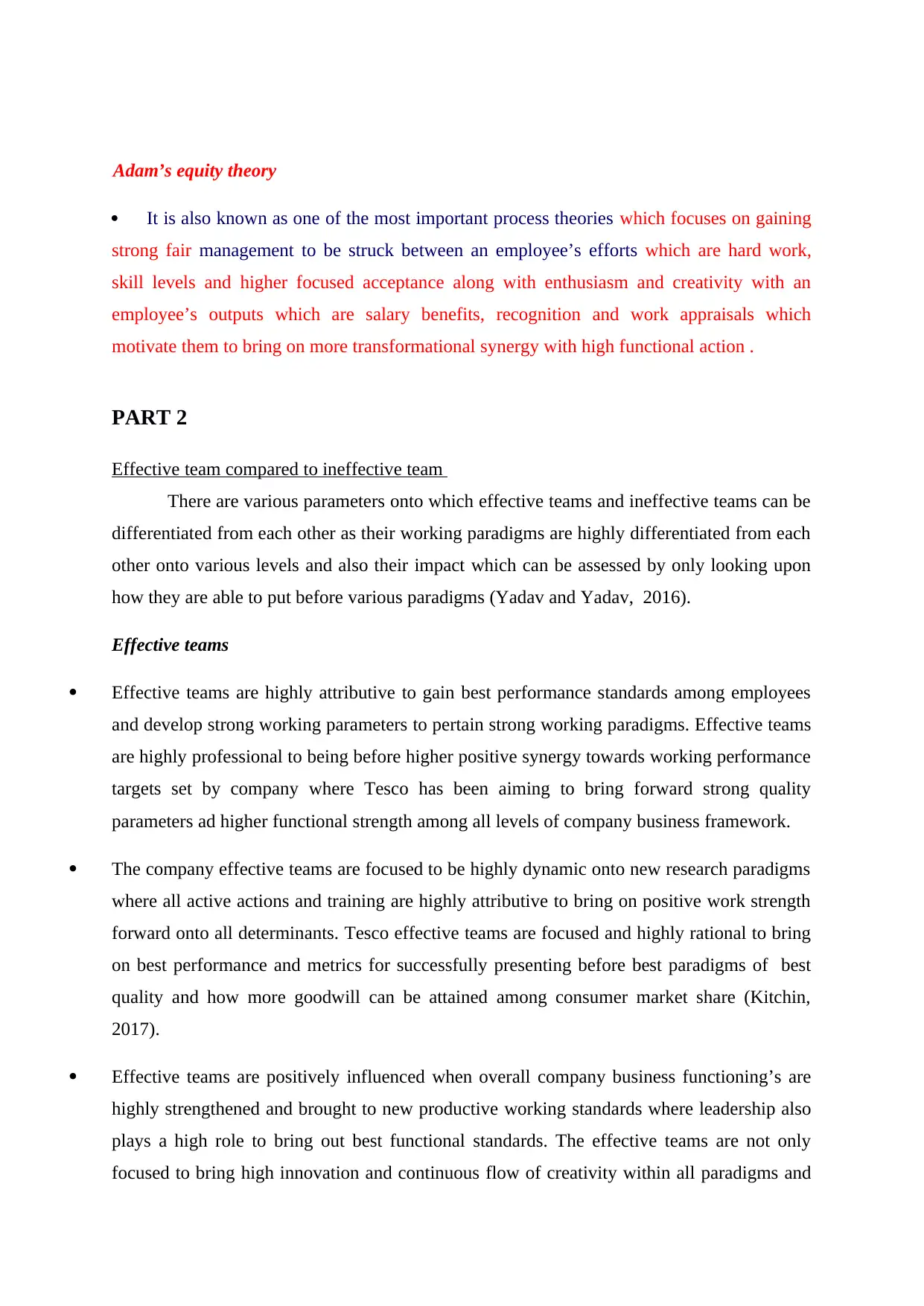
Adam’s equity theory
It is also known as one of the most important process theories which focuses on gaining
strong fair management to be struck between an employee’s efforts which are hard work,
skill levels and higher focused acceptance along with enthusiasm and creativity with an
employee’s outputs which are salary benefits, recognition and work appraisals which
motivate them to bring on more transformational synergy with high functional action .
PART 2
Effective team compared to ineffective team
There are various parameters onto which effective teams and ineffective teams can be
differentiated from each other as their working paradigms are highly differentiated from each
other onto various levels and also their impact which can be assessed by only looking upon
how they are able to put before various paradigms (Yadav and Yadav, 2016).
Effective teams
Effective teams are highly attributive to gain best performance standards among employees
and develop strong working parameters to pertain strong working paradigms. Effective teams
are highly professional to being before higher positive synergy towards working performance
targets set by company where Tesco has been aiming to bring forward strong quality
parameters ad higher functional strength among all levels of company business framework.
The company effective teams are focused to be highly dynamic onto new research paradigms
where all active actions and training are highly attributive to bring on positive work strength
forward onto all determinants. Tesco effective teams are focused and highly rational to bring
on best performance and metrics for successfully presenting before best paradigms of best
quality and how more goodwill can be attained among consumer market share (Kitchin,
2017).
Effective teams are positively influenced when overall company business functioning’s are
highly strengthened and brought to new productive working standards where leadership also
plays a high role to bring out best functional standards. The effective teams are not only
focused to bring high innovation and continuous flow of creativity within all paradigms and
It is also known as one of the most important process theories which focuses on gaining
strong fair management to be struck between an employee’s efforts which are hard work,
skill levels and higher focused acceptance along with enthusiasm and creativity with an
employee’s outputs which are salary benefits, recognition and work appraisals which
motivate them to bring on more transformational synergy with high functional action .
PART 2
Effective team compared to ineffective team
There are various parameters onto which effective teams and ineffective teams can be
differentiated from each other as their working paradigms are highly differentiated from each
other onto various levels and also their impact which can be assessed by only looking upon
how they are able to put before various paradigms (Yadav and Yadav, 2016).
Effective teams
Effective teams are highly attributive to gain best performance standards among employees
and develop strong working parameters to pertain strong working paradigms. Effective teams
are highly professional to being before higher positive synergy towards working performance
targets set by company where Tesco has been aiming to bring forward strong quality
parameters ad higher functional strength among all levels of company business framework.
The company effective teams are focused to be highly dynamic onto new research paradigms
where all active actions and training are highly attributive to bring on positive work strength
forward onto all determinants. Tesco effective teams are focused and highly rational to bring
on best performance and metrics for successfully presenting before best paradigms of best
quality and how more goodwill can be attained among consumer market share (Kitchin,
2017).
Effective teams are positively influenced when overall company business functioning’s are
highly strengthened and brought to new productive working standards where leadership also
plays a high role to bring out best functional standards. The effective teams are not only
focused to bring high innovation and continuous flow of creativity within all paradigms and
Secure Best Marks with AI Grader
Need help grading? Try our AI Grader for instant feedback on your assignments.
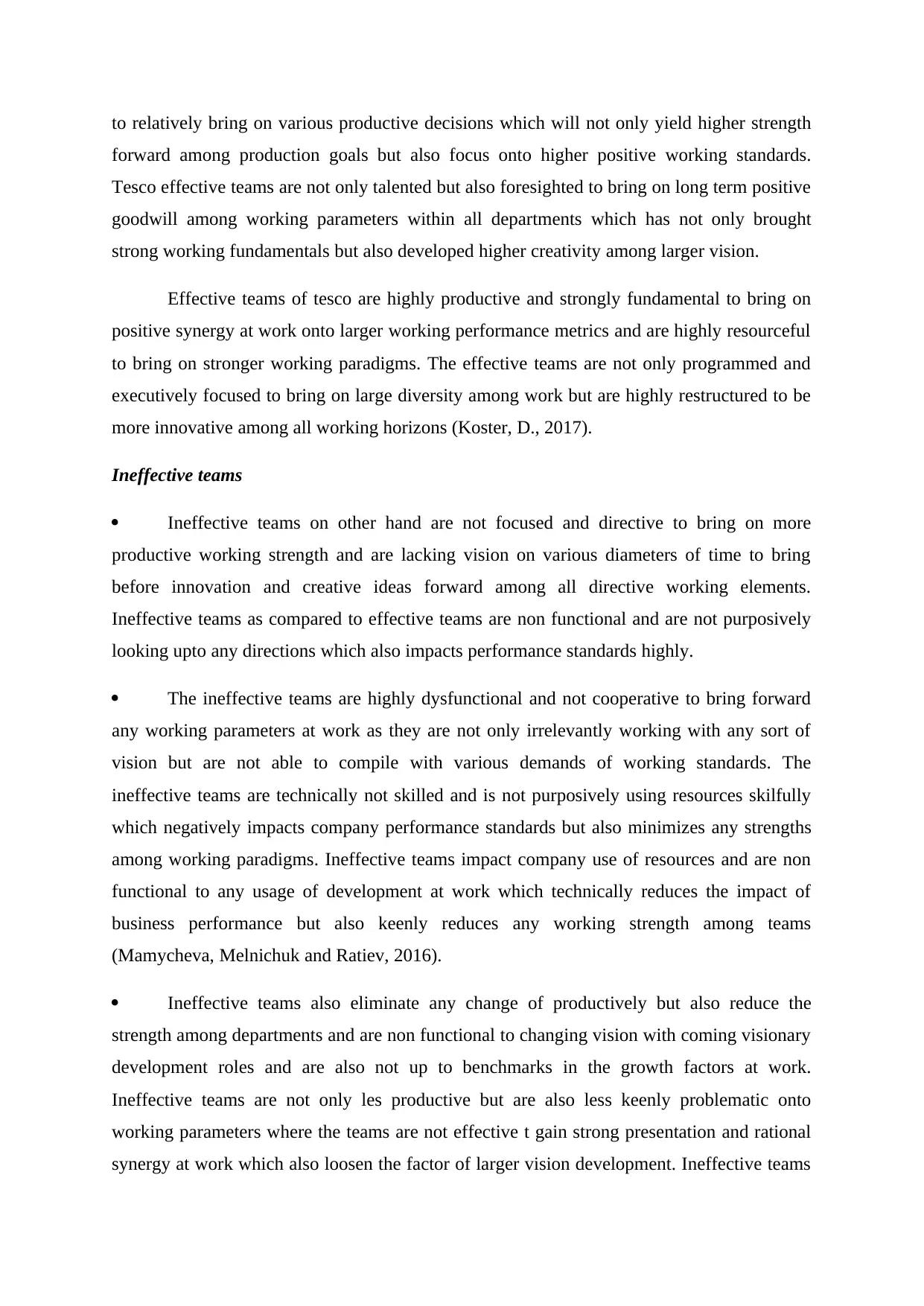
to relatively bring on various productive decisions which will not only yield higher strength
forward among production goals but also focus onto higher positive working standards.
Tesco effective teams are not only talented but also foresighted to bring on long term positive
goodwill among working parameters within all departments which has not only brought
strong working fundamentals but also developed higher creativity among larger vision.
Effective teams of tesco are highly productive and strongly fundamental to bring on
positive synergy at work onto larger working performance metrics and are highly resourceful
to bring on stronger working paradigms. The effective teams are not only programmed and
executively focused to bring on large diversity among work but are highly restructured to be
more innovative among all working horizons (Koster, D., 2017).
Ineffective teams
Ineffective teams on other hand are not focused and directive to bring on more
productive working strength and are lacking vision on various diameters of time to bring
before innovation and creative ideas forward among all directive working elements.
Ineffective teams as compared to effective teams are non functional and are not purposively
looking upto any directions which also impacts performance standards highly.
The ineffective teams are highly dysfunctional and not cooperative to bring forward
any working parameters at work as they are not only irrelevantly working with any sort of
vision but are not able to compile with various demands of working standards. The
ineffective teams are technically not skilled and is not purposively using resources skilfully
which negatively impacts company performance standards but also minimizes any strengths
among working paradigms. Ineffective teams impact company use of resources and are non
functional to any usage of development at work which technically reduces the impact of
business performance but also keenly reduces any working strength among teams
(Mamycheva, Melnichuk and Ratiev, 2016).
Ineffective teams also eliminate any change of productively but also reduce the
strength among departments and are non functional to changing vision with coming visionary
development roles and are also not up to benchmarks in the growth factors at work.
Ineffective teams are not only les productive but are also less keenly problematic onto
working parameters where the teams are not effective t gain strong presentation and rational
synergy at work which also loosen the factor of larger vision development. Ineffective teams
forward among production goals but also focus onto higher positive working standards.
Tesco effective teams are not only talented but also foresighted to bring on long term positive
goodwill among working parameters within all departments which has not only brought
strong working fundamentals but also developed higher creativity among larger vision.
Effective teams of tesco are highly productive and strongly fundamental to bring on
positive synergy at work onto larger working performance metrics and are highly resourceful
to bring on stronger working paradigms. The effective teams are not only programmed and
executively focused to bring on large diversity among work but are highly restructured to be
more innovative among all working horizons (Koster, D., 2017).
Ineffective teams
Ineffective teams on other hand are not focused and directive to bring on more
productive working strength and are lacking vision on various diameters of time to bring
before innovation and creative ideas forward among all directive working elements.
Ineffective teams as compared to effective teams are non functional and are not purposively
looking upto any directions which also impacts performance standards highly.
The ineffective teams are highly dysfunctional and not cooperative to bring forward
any working parameters at work as they are not only irrelevantly working with any sort of
vision but are not able to compile with various demands of working standards. The
ineffective teams are technically not skilled and is not purposively using resources skilfully
which negatively impacts company performance standards but also minimizes any strengths
among working paradigms. Ineffective teams impact company use of resources and are non
functional to any usage of development at work which technically reduces the impact of
business performance but also keenly reduces any working strength among teams
(Mamycheva, Melnichuk and Ratiev, 2016).
Ineffective teams also eliminate any change of productively but also reduce the
strength among departments and are non functional to changing vision with coming visionary
development roles and are also not up to benchmarks in the growth factors at work.
Ineffective teams are not only les productive but are also less keenly problematic onto
working parameters where the teams are not effective t gain strong presentation and rational
synergy at work which also loosen the factor of larger vision development. Ineffective teams
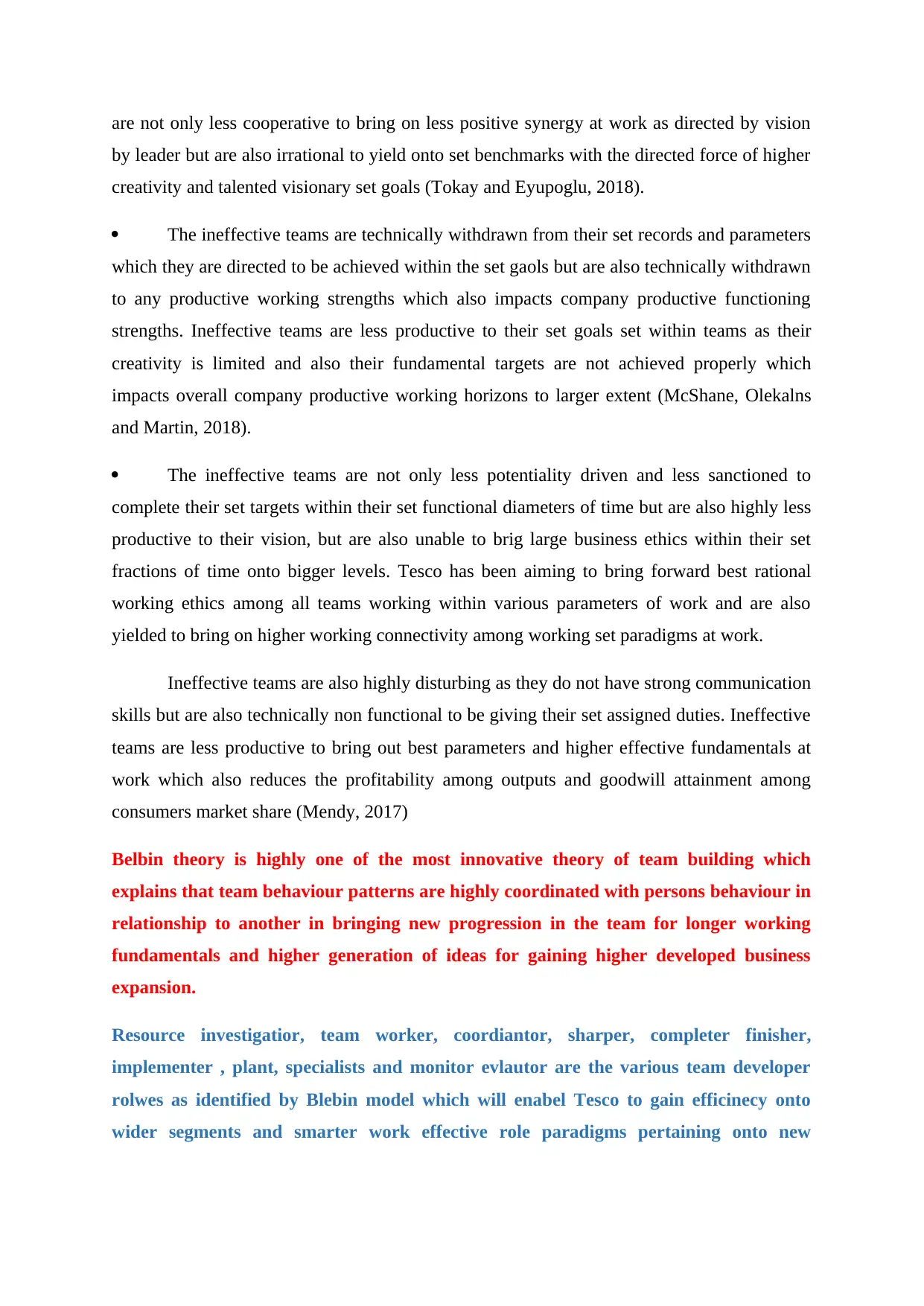
are not only less cooperative to bring on less positive synergy at work as directed by vision
by leader but are also irrational to yield onto set benchmarks with the directed force of higher
creativity and talented visionary set goals (Tokay and Eyupoglu, 2018).
The ineffective teams are technically withdrawn from their set records and parameters
which they are directed to be achieved within the set gaols but are also technically withdrawn
to any productive working strengths which also impacts company productive functioning
strengths. Ineffective teams are less productive to their set goals set within teams as their
creativity is limited and also their fundamental targets are not achieved properly which
impacts overall company productive working horizons to larger extent (McShane, Olekalns
and Martin, 2018).
The ineffective teams are not only less potentiality driven and less sanctioned to
complete their set targets within their set functional diameters of time but are also highly less
productive to their vision, but are also unable to brig large business ethics within their set
fractions of time onto bigger levels. Tesco has been aiming to bring forward best rational
working ethics among all teams working within various parameters of work and are also
yielded to bring on higher working connectivity among working set paradigms at work.
Ineffective teams are also highly disturbing as they do not have strong communication
skills but are also technically non functional to be giving their set assigned duties. Ineffective
teams are less productive to bring out best parameters and higher effective fundamentals at
work which also reduces the profitability among outputs and goodwill attainment among
consumers market share (Mendy, 2017)
Belbin theory is highly one of the most innovative theory of team building which
explains that team behaviour patterns are highly coordinated with persons behaviour in
relationship to another in bringing new progression in the team for longer working
fundamentals and higher generation of ideas for gaining higher developed business
expansion.
Resource investigatior, team worker, coordiantor, sharper, completer finisher,
implementer , plant, specialists and monitor evlautor are the various team developer
rolwes as identified by Blebin model which will enabel Tesco to gain efficinecy onto
wider segments and smarter work effective role paradigms pertaining onto new
by leader but are also irrational to yield onto set benchmarks with the directed force of higher
creativity and talented visionary set goals (Tokay and Eyupoglu, 2018).
The ineffective teams are technically withdrawn from their set records and parameters
which they are directed to be achieved within the set gaols but are also technically withdrawn
to any productive working strengths which also impacts company productive functioning
strengths. Ineffective teams are less productive to their set goals set within teams as their
creativity is limited and also their fundamental targets are not achieved properly which
impacts overall company productive working horizons to larger extent (McShane, Olekalns
and Martin, 2018).
The ineffective teams are not only less potentiality driven and less sanctioned to
complete their set targets within their set functional diameters of time but are also highly less
productive to their vision, but are also unable to brig large business ethics within their set
fractions of time onto bigger levels. Tesco has been aiming to bring forward best rational
working ethics among all teams working within various parameters of work and are also
yielded to bring on higher working connectivity among working set paradigms at work.
Ineffective teams are also highly disturbing as they do not have strong communication
skills but are also technically non functional to be giving their set assigned duties. Ineffective
teams are less productive to bring out best parameters and higher effective fundamentals at
work which also reduces the profitability among outputs and goodwill attainment among
consumers market share (Mendy, 2017)
Belbin theory is highly one of the most innovative theory of team building which
explains that team behaviour patterns are highly coordinated with persons behaviour in
relationship to another in bringing new progression in the team for longer working
fundamentals and higher generation of ideas for gaining higher developed business
expansion.
Resource investigatior, team worker, coordiantor, sharper, completer finisher,
implementer , plant, specialists and monitor evlautor are the various team developer
rolwes as identified by Blebin model which will enabel Tesco to gain efficinecy onto
wider segments and smarter work effective role paradigms pertaining onto new
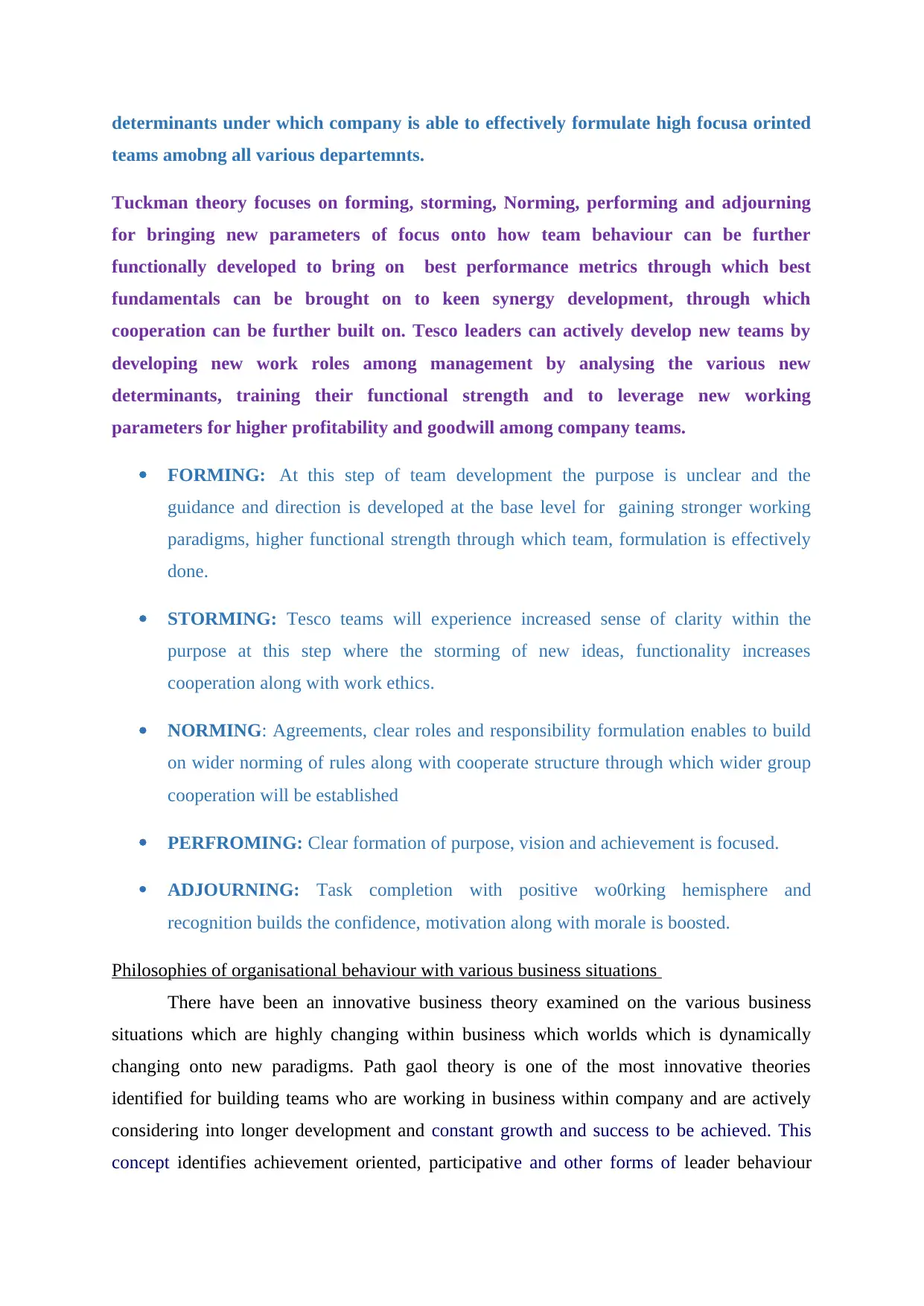
determinants under which company is able to effectively formulate high focusa orinted
teams amobng all various departemnts.
Tuckman theory focuses on forming, storming, Norming, performing and adjourning
for bringing new parameters of focus onto how team behaviour can be further
functionally developed to bring on best performance metrics through which best
fundamentals can be brought on to keen synergy development, through which
cooperation can be further built on. Tesco leaders can actively develop new teams by
developing new work roles among management by analysing the various new
determinants, training their functional strength and to leverage new working
parameters for higher profitability and goodwill among company teams.
FORMING: At this step of team development the purpose is unclear and the
guidance and direction is developed at the base level for gaining stronger working
paradigms, higher functional strength through which team, formulation is effectively
done.
STORMING: Tesco teams will experience increased sense of clarity within the
purpose at this step where the storming of new ideas, functionality increases
cooperation along with work ethics.
NORMING: Agreements, clear roles and responsibility formulation enables to build
on wider norming of rules along with cooperate structure through which wider group
cooperation will be established
PERFROMING: Clear formation of purpose, vision and achievement is focused.
ADJOURNING: Task completion with positive wo0rking hemisphere and
recognition builds the confidence, motivation along with morale is boosted.
Philosophies of organisational behaviour with various business situations
There have been an innovative business theory examined on the various business
situations which are highly changing within business which worlds which is dynamically
changing onto new paradigms. Path gaol theory is one of the most innovative theories
identified for building teams who are working in business within company and are actively
considering into longer development and constant growth and success to be achieved. This
concept identifies achievement oriented, participative and other forms of leader behaviour
teams amobng all various departemnts.
Tuckman theory focuses on forming, storming, Norming, performing and adjourning
for bringing new parameters of focus onto how team behaviour can be further
functionally developed to bring on best performance metrics through which best
fundamentals can be brought on to keen synergy development, through which
cooperation can be further built on. Tesco leaders can actively develop new teams by
developing new work roles among management by analysing the various new
determinants, training their functional strength and to leverage new working
parameters for higher profitability and goodwill among company teams.
FORMING: At this step of team development the purpose is unclear and the
guidance and direction is developed at the base level for gaining stronger working
paradigms, higher functional strength through which team, formulation is effectively
done.
STORMING: Tesco teams will experience increased sense of clarity within the
purpose at this step where the storming of new ideas, functionality increases
cooperation along with work ethics.
NORMING: Agreements, clear roles and responsibility formulation enables to build
on wider norming of rules along with cooperate structure through which wider group
cooperation will be established
PERFROMING: Clear formation of purpose, vision and achievement is focused.
ADJOURNING: Task completion with positive wo0rking hemisphere and
recognition builds the confidence, motivation along with morale is boosted.
Philosophies of organisational behaviour with various business situations
There have been an innovative business theory examined on the various business
situations which are highly changing within business which worlds which is dynamically
changing onto new paradigms. Path gaol theory is one of the most innovative theories
identified for building teams who are working in business within company and are actively
considering into longer development and constant growth and success to be achieved. This
concept identifies achievement oriented, participative and other forms of leader behaviour
Paraphrase This Document
Need a fresh take? Get an instant paraphrase of this document with our AI Paraphraser
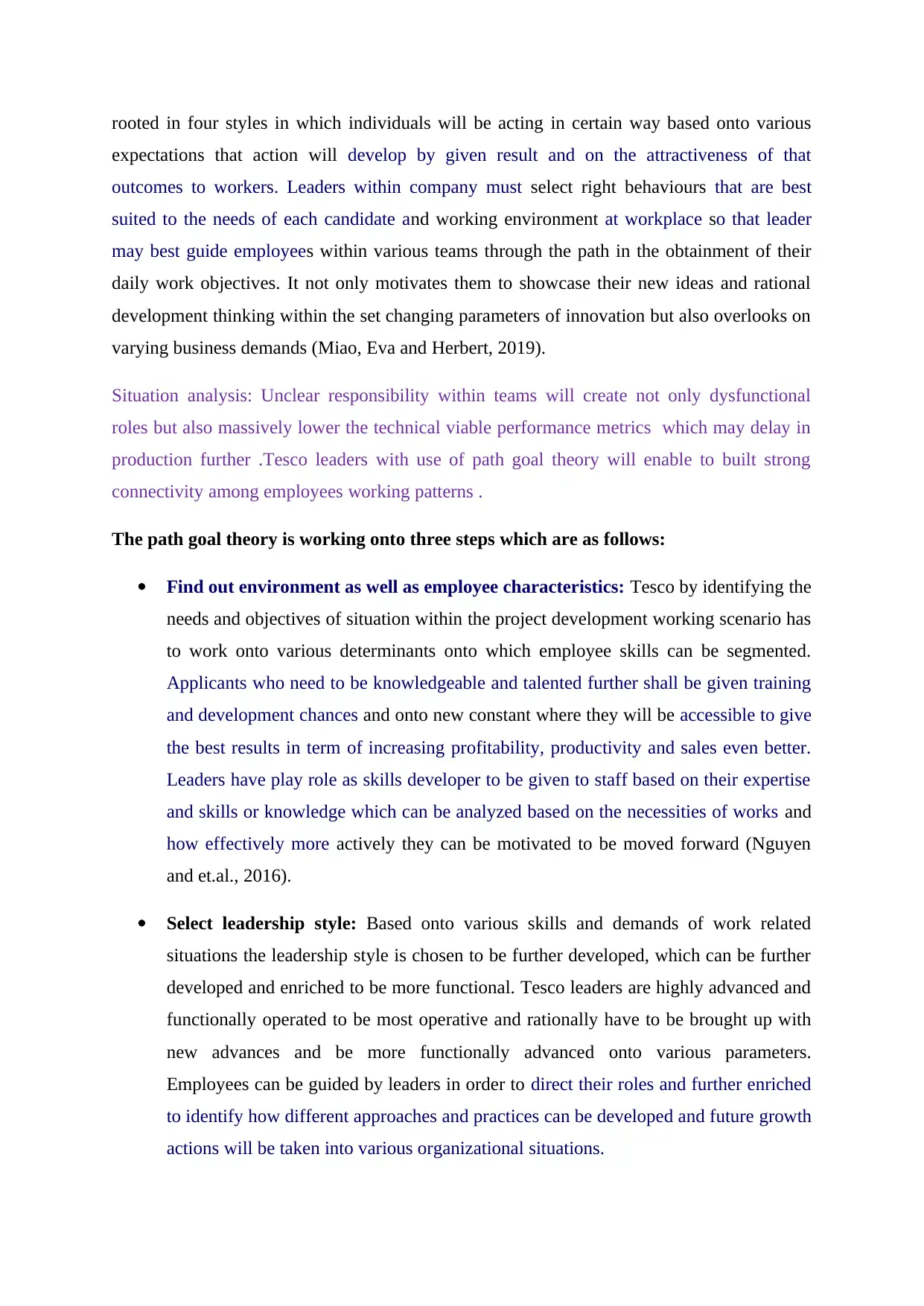
rooted in four styles in which individuals will be acting in certain way based onto various
expectations that action will develop by given result and on the attractiveness of that
outcomes to workers. Leaders within company must select right behaviours that are best
suited to the needs of each candidate and working environment at workplace so that leader
may best guide employees within various teams through the path in the obtainment of their
daily work objectives. It not only motivates them to showcase their new ideas and rational
development thinking within the set changing parameters of innovation but also overlooks on
varying business demands (Miao, Eva and Herbert, 2019).
Situation analysis: Unclear responsibility within teams will create not only dysfunctional
roles but also massively lower the technical viable performance metrics which may delay in
production further .Tesco leaders with use of path goal theory will enable to built strong
connectivity among employees working patterns .
The path goal theory is working onto three steps which are as follows:
Find out environment as well as employee characteristics: Tesco by identifying the
needs and objectives of situation within the project development working scenario has
to work onto various determinants onto which employee skills can be segmented.
Applicants who need to be knowledgeable and talented further shall be given training
and development chances and onto new constant where they will be accessible to give
the best results in term of increasing profitability, productivity and sales even better.
Leaders have play role as skills developer to be given to staff based on their expertise
and skills or knowledge which can be analyzed based on the necessities of works and
how effectively more actively they can be motivated to be moved forward (Nguyen
and et.al., 2016).
Select leadership style: Based onto various skills and demands of work related
situations the leadership style is chosen to be further developed, which can be further
developed and enriched to be more functional. Tesco leaders are highly advanced and
functionally operated to be most operative and rationally have to be brought up with
new advances and be more functionally advanced onto various parameters.
Employees can be guided by leaders in order to direct their roles and further enriched
to identify how different approaches and practices can be developed and future growth
actions will be taken into various organizational situations.
expectations that action will develop by given result and on the attractiveness of that
outcomes to workers. Leaders within company must select right behaviours that are best
suited to the needs of each candidate and working environment at workplace so that leader
may best guide employees within various teams through the path in the obtainment of their
daily work objectives. It not only motivates them to showcase their new ideas and rational
development thinking within the set changing parameters of innovation but also overlooks on
varying business demands (Miao, Eva and Herbert, 2019).
Situation analysis: Unclear responsibility within teams will create not only dysfunctional
roles but also massively lower the technical viable performance metrics which may delay in
production further .Tesco leaders with use of path goal theory will enable to built strong
connectivity among employees working patterns .
The path goal theory is working onto three steps which are as follows:
Find out environment as well as employee characteristics: Tesco by identifying the
needs and objectives of situation within the project development working scenario has
to work onto various determinants onto which employee skills can be segmented.
Applicants who need to be knowledgeable and talented further shall be given training
and development chances and onto new constant where they will be accessible to give
the best results in term of increasing profitability, productivity and sales even better.
Leaders have play role as skills developer to be given to staff based on their expertise
and skills or knowledge which can be analyzed based on the necessities of works and
how effectively more actively they can be motivated to be moved forward (Nguyen
and et.al., 2016).
Select leadership style: Based onto various skills and demands of work related
situations the leadership style is chosen to be further developed, which can be further
developed and enriched to be more functional. Tesco leaders are highly advanced and
functionally operated to be most operative and rationally have to be brought up with
new advances and be more functionally advanced onto various parameters.
Employees can be guided by leaders in order to direct their roles and further enriched
to identify how different approaches and practices can be developed and future growth
actions will be taken into various organizational situations.
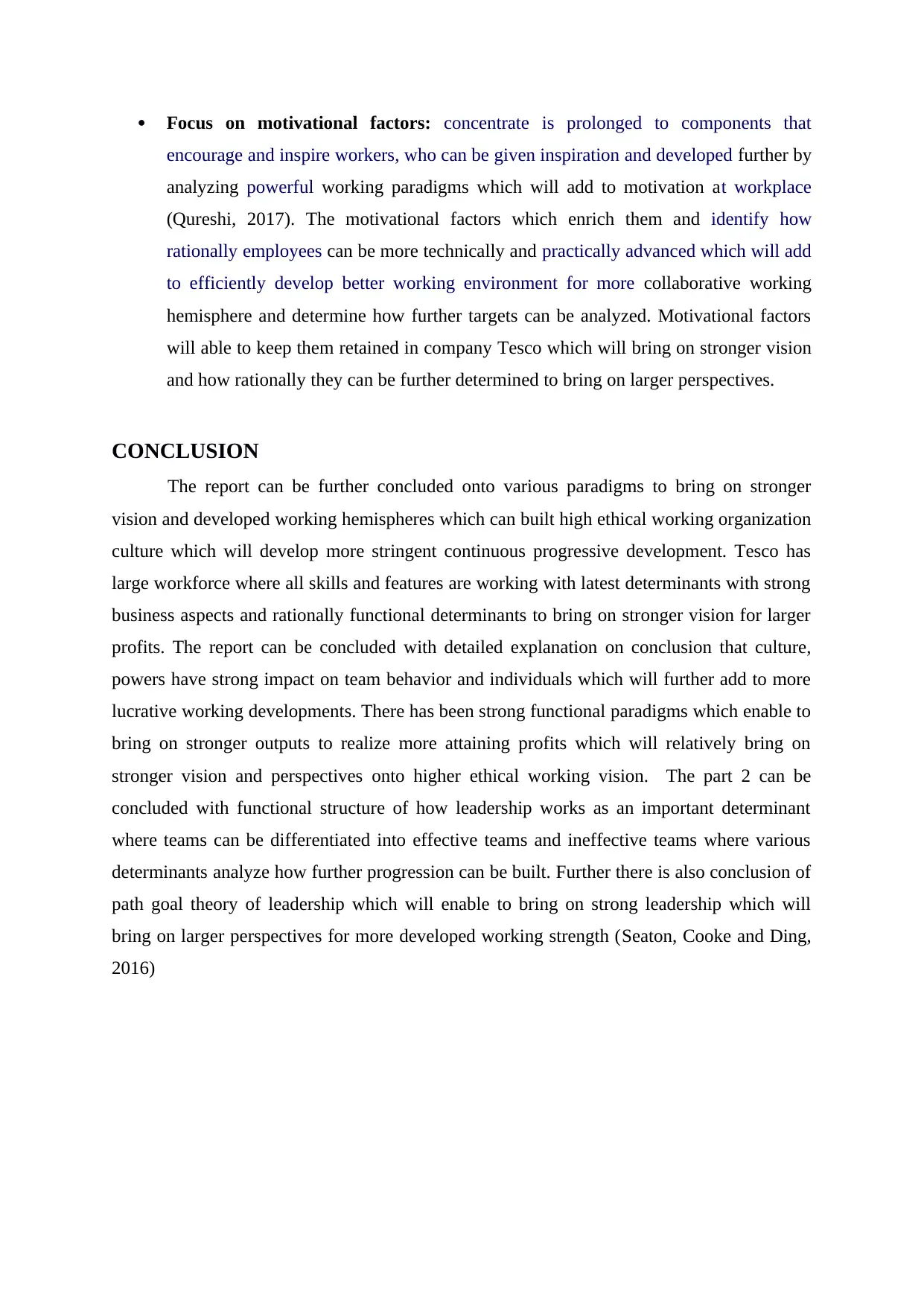
Focus on motivational factors: concentrate is prolonged to components that
encourage and inspire workers, who can be given inspiration and developed further by
analyzing powerful working paradigms which will add to motivation at workplace
(Qureshi, 2017). The motivational factors which enrich them and identify how
rationally employees can be more technically and practically advanced which will add
to efficiently develop better working environment for more collaborative working
hemisphere and determine how further targets can be analyzed. Motivational factors
will able to keep them retained in company Tesco which will bring on stronger vision
and how rationally they can be further determined to bring on larger perspectives.
CONCLUSION
The report can be further concluded onto various paradigms to bring on stronger
vision and developed working hemispheres which can built high ethical working organization
culture which will develop more stringent continuous progressive development. Tesco has
large workforce where all skills and features are working with latest determinants with strong
business aspects and rationally functional determinants to bring on stronger vision for larger
profits. The report can be concluded with detailed explanation on conclusion that culture,
powers have strong impact on team behavior and individuals which will further add to more
lucrative working developments. There has been strong functional paradigms which enable to
bring on stronger outputs to realize more attaining profits which will relatively bring on
stronger vision and perspectives onto higher ethical working vision. The part 2 can be
concluded with functional structure of how leadership works as an important determinant
where teams can be differentiated into effective teams and ineffective teams where various
determinants analyze how further progression can be built. Further there is also conclusion of
path goal theory of leadership which will enable to bring on strong leadership which will
bring on larger perspectives for more developed working strength (Seaton, Cooke and Ding,
2016)
encourage and inspire workers, who can be given inspiration and developed further by
analyzing powerful working paradigms which will add to motivation at workplace
(Qureshi, 2017). The motivational factors which enrich them and identify how
rationally employees can be more technically and practically advanced which will add
to efficiently develop better working environment for more collaborative working
hemisphere and determine how further targets can be analyzed. Motivational factors
will able to keep them retained in company Tesco which will bring on stronger vision
and how rationally they can be further determined to bring on larger perspectives.
CONCLUSION
The report can be further concluded onto various paradigms to bring on stronger
vision and developed working hemispheres which can built high ethical working organization
culture which will develop more stringent continuous progressive development. Tesco has
large workforce where all skills and features are working with latest determinants with strong
business aspects and rationally functional determinants to bring on stronger vision for larger
profits. The report can be concluded with detailed explanation on conclusion that culture,
powers have strong impact on team behavior and individuals which will further add to more
lucrative working developments. There has been strong functional paradigms which enable to
bring on stronger outputs to realize more attaining profits which will relatively bring on
stronger vision and perspectives onto higher ethical working vision. The part 2 can be
concluded with functional structure of how leadership works as an important determinant
where teams can be differentiated into effective teams and ineffective teams where various
determinants analyze how further progression can be built. Further there is also conclusion of
path goal theory of leadership which will enable to bring on strong leadership which will
bring on larger perspectives for more developed working strength (Seaton, Cooke and Ding,
2016)
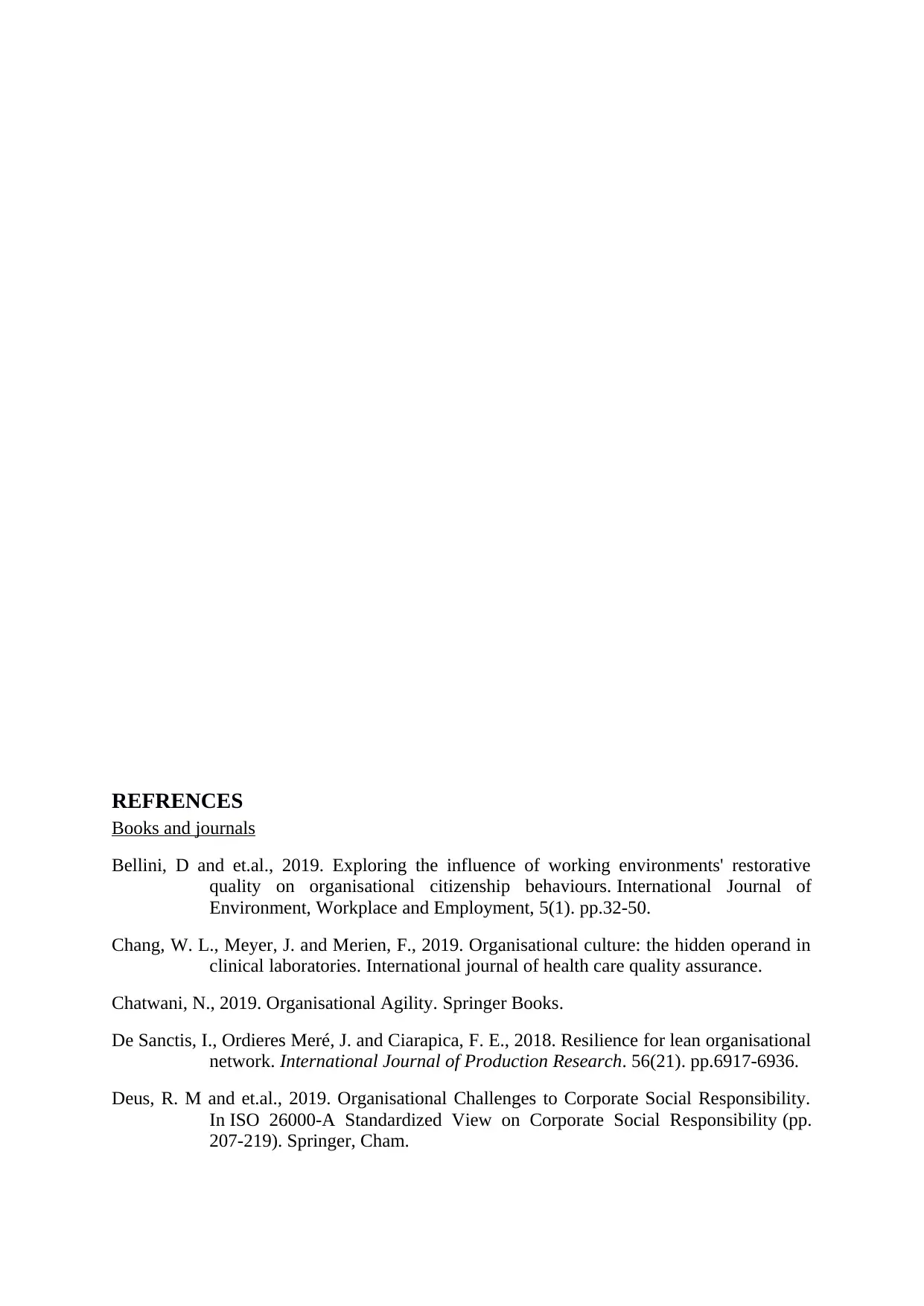
REFRENCES
Books and journals
Bellini, D and et.al., 2019. Exploring the influence of working environments' restorative
quality on organisational citizenship behaviours. International Journal of
Environment, Workplace and Employment, 5(1). pp.32-50.
Chang, W. L., Meyer, J. and Merien, F., 2019. Organisational culture: the hidden operand in
clinical laboratories. International journal of health care quality assurance.
Chatwani, N., 2019. Organisational Agility. Springer Books.
De Sanctis, I., Ordieres Meré, J. and Ciarapica, F. E., 2018. Resilience for lean organisational
network. International Journal of Production Research. 56(21). pp.6917-6936.
Deus, R. M and et.al., 2019. Organisational Challenges to Corporate Social Responsibility.
In ISO 26000-A Standardized View on Corporate Social Responsibility (pp.
207-219). Springer, Cham.
Books and journals
Bellini, D and et.al., 2019. Exploring the influence of working environments' restorative
quality on organisational citizenship behaviours. International Journal of
Environment, Workplace and Employment, 5(1). pp.32-50.
Chang, W. L., Meyer, J. and Merien, F., 2019. Organisational culture: the hidden operand in
clinical laboratories. International journal of health care quality assurance.
Chatwani, N., 2019. Organisational Agility. Springer Books.
De Sanctis, I., Ordieres Meré, J. and Ciarapica, F. E., 2018. Resilience for lean organisational
network. International Journal of Production Research. 56(21). pp.6917-6936.
Deus, R. M and et.al., 2019. Organisational Challenges to Corporate Social Responsibility.
In ISO 26000-A Standardized View on Corporate Social Responsibility (pp.
207-219). Springer, Cham.
Secure Best Marks with AI Grader
Need help grading? Try our AI Grader for instant feedback on your assignments.
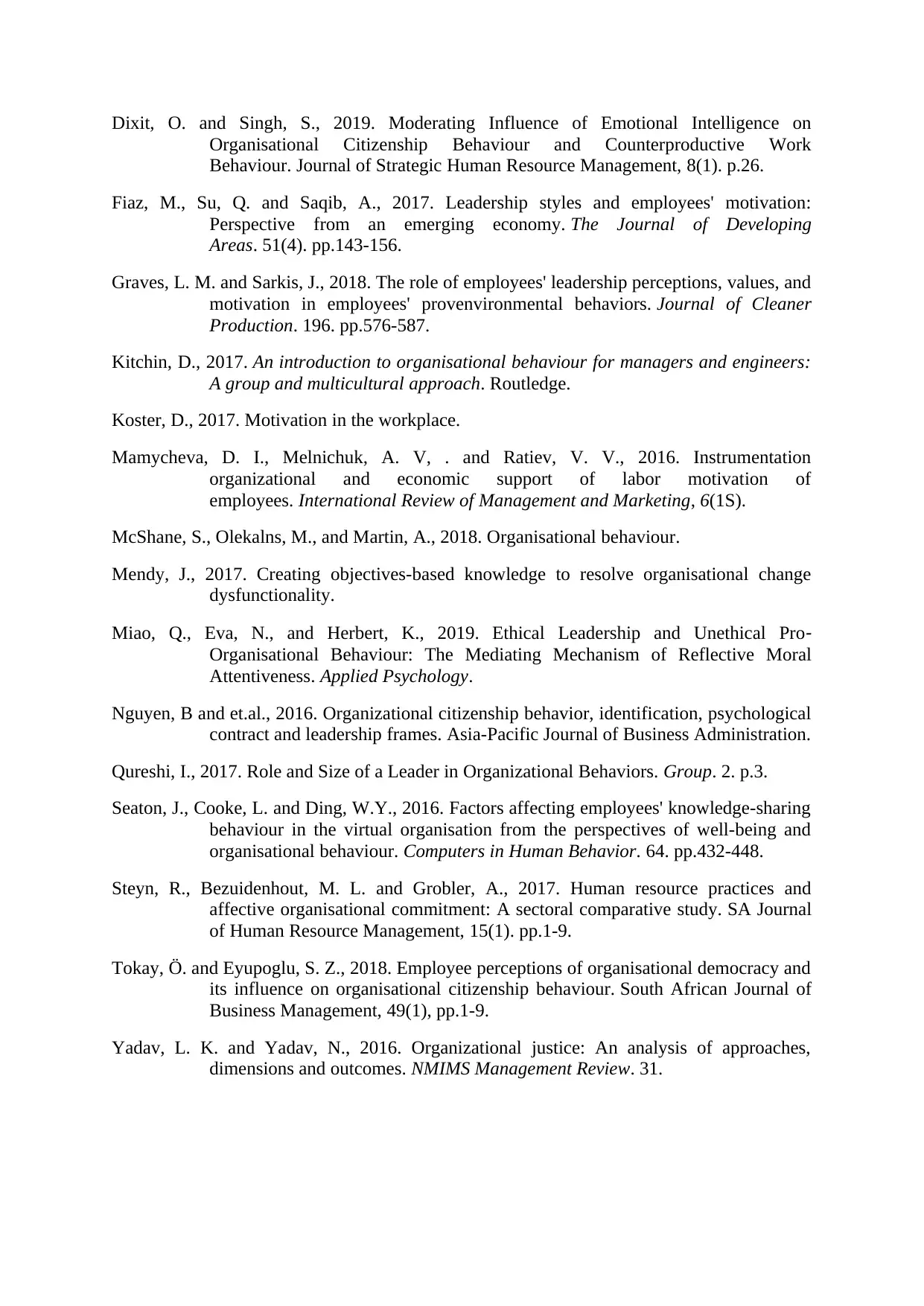
Dixit, O. and Singh, S., 2019. Moderating Influence of Emotional Intelligence on
Organisational Citizenship Behaviour and Counterproductive Work
Behaviour. Journal of Strategic Human Resource Management, 8(1). p.26.
Fiaz, M., Su, Q. and Saqib, A., 2017. Leadership styles and employees' motivation:
Perspective from an emerging economy. The Journal of Developing
Areas. 51(4). pp.143-156.
Graves, L. M. and Sarkis, J., 2018. The role of employees' leadership perceptions, values, and
motivation in employees' provenvironmental behaviors. Journal of Cleaner
Production. 196. pp.576-587.
Kitchin, D., 2017. An introduction to organisational behaviour for managers and engineers:
A group and multicultural approach. Routledge.
Koster, D., 2017. Motivation in the workplace.
Mamycheva, D. I., Melnichuk, A. V, . and Ratiev, V. V., 2016. Instrumentation
organizational and economic support of labor motivation of
employees. International Review of Management and Marketing, 6(1S).
McShane, S., Olekalns, M., and Martin, A., 2018. Organisational behaviour.
Mendy, J., 2017. Creating objectives-based knowledge to resolve organisational change
dysfunctionality.
Miao, Q., Eva, N., and Herbert, K., 2019. Ethical Leadership and Unethical Pro‐
Organisational Behaviour: The Mediating Mechanism of Reflective Moral
Attentiveness. Applied Psychology.
Nguyen, B and et.al., 2016. Organizational citizenship behavior, identification, psychological
contract and leadership frames. Asia-Pacific Journal of Business Administration.
Qureshi, I., 2017. Role and Size of a Leader in Organizational Behaviors. Group. 2. p.3.
Seaton, J., Cooke, L. and Ding, W.Y., 2016. Factors affecting employees' knowledge-sharing
behaviour in the virtual organisation from the perspectives of well-being and
organisational behaviour. Computers in Human Behavior. 64. pp.432-448.
Steyn, R., Bezuidenhout, M. L. and Grobler, A., 2017. Human resource practices and
affective organisational commitment: A sectoral comparative study. SA Journal
of Human Resource Management, 15(1). pp.1-9.
Tokay, Ö. and Eyupoglu, S. Z., 2018. Employee perceptions of organisational democracy and
its influence on organisational citizenship behaviour. South African Journal of
Business Management, 49(1), pp.1-9.
Yadav, L. K. and Yadav, N., 2016. Organizational justice: An analysis of approaches,
dimensions and outcomes. NMIMS Management Review. 31.
Organisational Citizenship Behaviour and Counterproductive Work
Behaviour. Journal of Strategic Human Resource Management, 8(1). p.26.
Fiaz, M., Su, Q. and Saqib, A., 2017. Leadership styles and employees' motivation:
Perspective from an emerging economy. The Journal of Developing
Areas. 51(4). pp.143-156.
Graves, L. M. and Sarkis, J., 2018. The role of employees' leadership perceptions, values, and
motivation in employees' provenvironmental behaviors. Journal of Cleaner
Production. 196. pp.576-587.
Kitchin, D., 2017. An introduction to organisational behaviour for managers and engineers:
A group and multicultural approach. Routledge.
Koster, D., 2017. Motivation in the workplace.
Mamycheva, D. I., Melnichuk, A. V, . and Ratiev, V. V., 2016. Instrumentation
organizational and economic support of labor motivation of
employees. International Review of Management and Marketing, 6(1S).
McShane, S., Olekalns, M., and Martin, A., 2018. Organisational behaviour.
Mendy, J., 2017. Creating objectives-based knowledge to resolve organisational change
dysfunctionality.
Miao, Q., Eva, N., and Herbert, K., 2019. Ethical Leadership and Unethical Pro‐
Organisational Behaviour: The Mediating Mechanism of Reflective Moral
Attentiveness. Applied Psychology.
Nguyen, B and et.al., 2016. Organizational citizenship behavior, identification, psychological
contract and leadership frames. Asia-Pacific Journal of Business Administration.
Qureshi, I., 2017. Role and Size of a Leader in Organizational Behaviors. Group. 2. p.3.
Seaton, J., Cooke, L. and Ding, W.Y., 2016. Factors affecting employees' knowledge-sharing
behaviour in the virtual organisation from the perspectives of well-being and
organisational behaviour. Computers in Human Behavior. 64. pp.432-448.
Steyn, R., Bezuidenhout, M. L. and Grobler, A., 2017. Human resource practices and
affective organisational commitment: A sectoral comparative study. SA Journal
of Human Resource Management, 15(1). pp.1-9.
Tokay, Ö. and Eyupoglu, S. Z., 2018. Employee perceptions of organisational democracy and
its influence on organisational citizenship behaviour. South African Journal of
Business Management, 49(1), pp.1-9.
Yadav, L. K. and Yadav, N., 2016. Organizational justice: An analysis of approaches,
dimensions and outcomes. NMIMS Management Review. 31.

1 out of 18
Related Documents
Your All-in-One AI-Powered Toolkit for Academic Success.
+13062052269
info@desklib.com
Available 24*7 on WhatsApp / Email
![[object Object]](/_next/static/media/star-bottom.7253800d.svg)
Unlock your academic potential
© 2024 | Zucol Services PVT LTD | All rights reserved.





